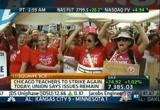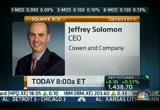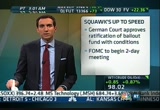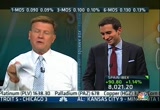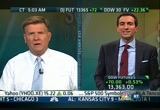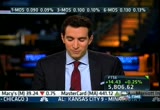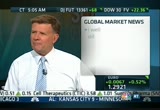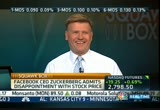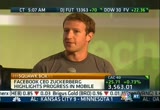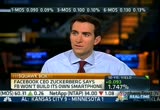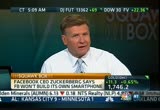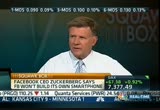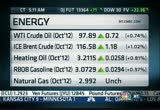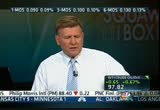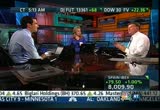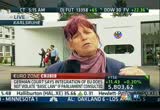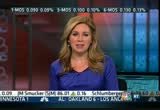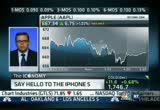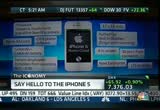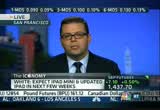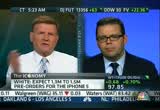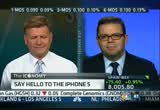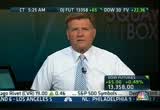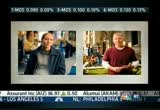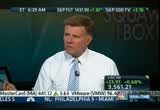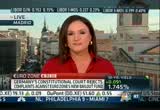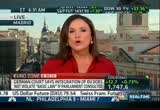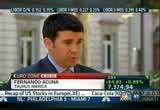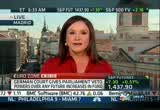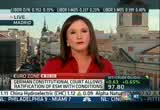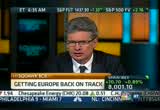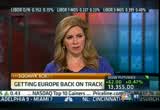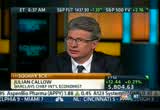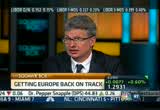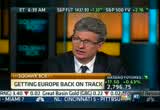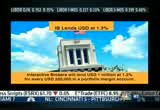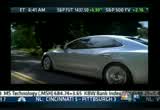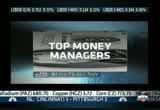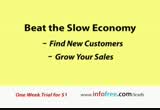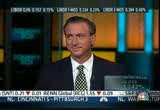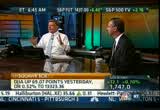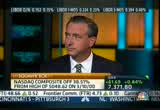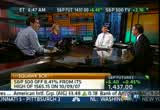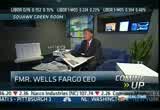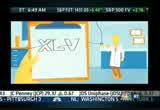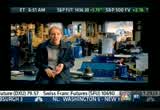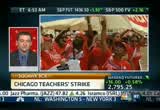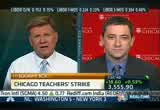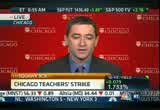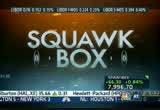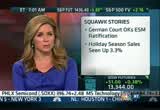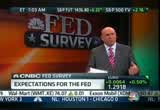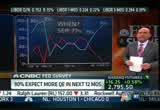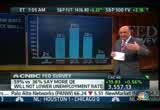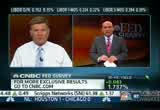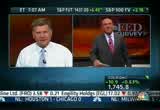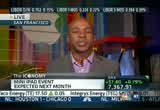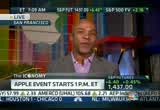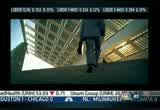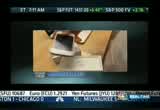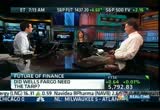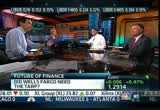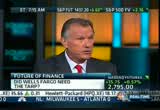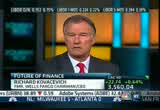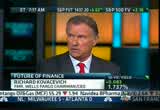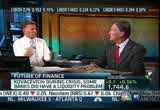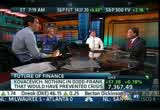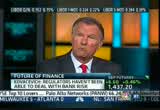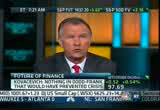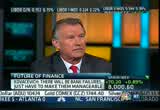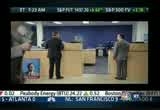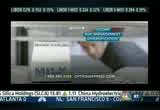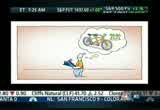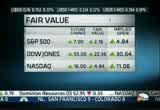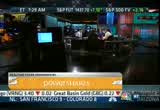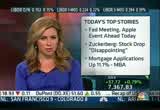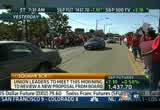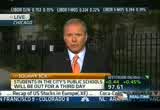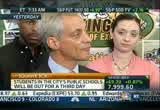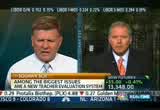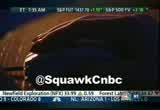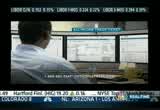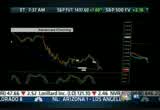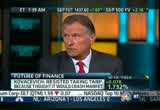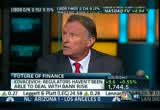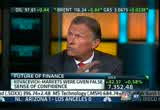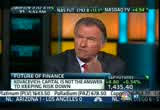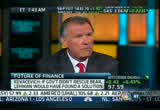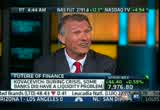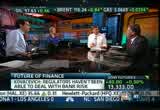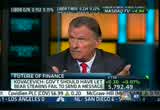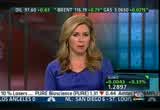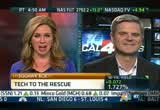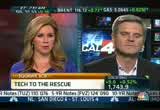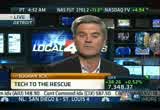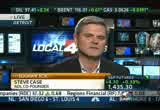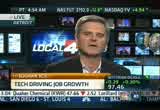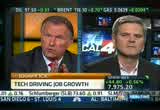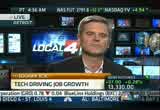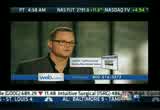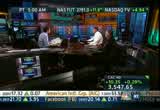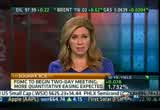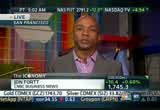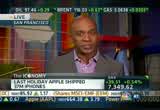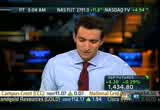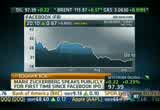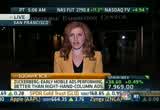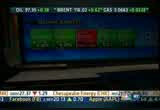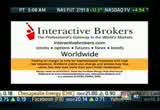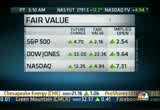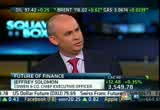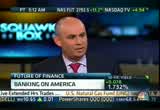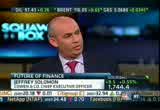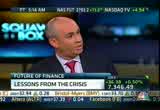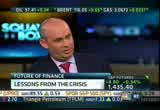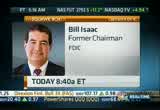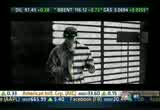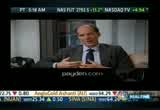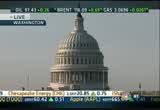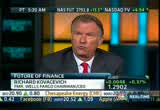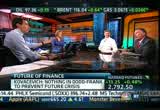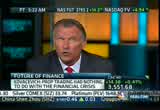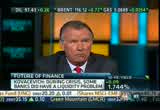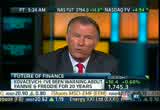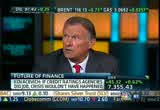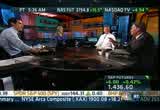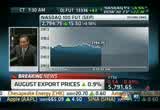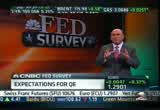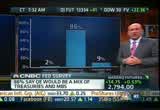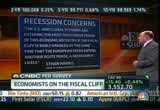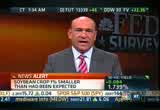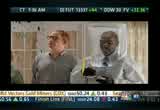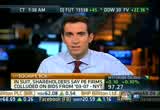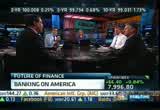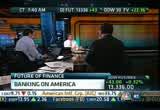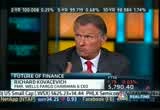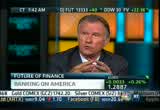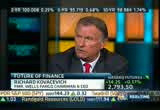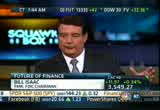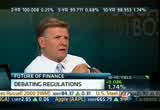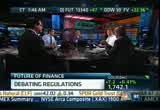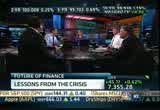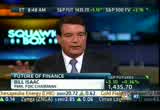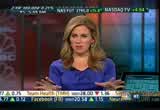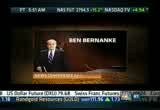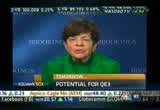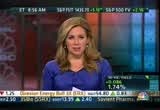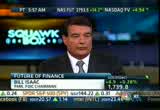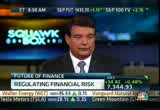tv Squawk Box CNBC September 12, 2012 6:00am-9:00am EDT
6:00 am
cnb. i'm becky. thousands of striking teachers will head back to the picket lines in chicago today. the union says it has agreed to just six of 49 articles in the current contract. so if you thought they were making progress, think again. one of the main sticking points is teacher evaluations. we'll be talking about education reform at 6:50 eastern time. and we are continuing our week long series on the future of finance. learning from the past, safeguarding the future. our news maker this morning is former wells fargo chairman, and here is a sample of what he said to us the last time he was on "squawk." >> i think tarp was one of the worst economic decisions in the history of the united states. >> okay. so like i said, he does not hold back on anything he's thinking about. he will be our guest host for two hours today, and that begins at 7:00 eastern. we are also going to be talking
6:01 am
finance with the ceo of cowen and company, jeffrey solomon, and bill isaac. plus the state of innovation, steve case will be joining us live at 7:30 eastern time. so we have a big show ahead. before we get to all of that, let's get you up to speed on the morning's headlines. andrew, good morning. >> thanks, becky. good morning to you. we will get you caught up on some of the big headlines. germany's highest court ruling that the country can ratify the new permanent european bailout fund, but there are conditions to germany's participation. here's the important part. parliament will have veto power over any future increases. we'll have more on that story in just a few moments. back here in the u.s., the fed is beginning to begin convening a two-day policy setting meeting in washington. market expectations high. many investors expect the central bank the unleash a third round of quantity sative
6:02 am
reezing. we'll get the decision tomorrow afternoon. ben bernanke will be holding that news conference. the big corporate story of the day, it is apple, the company holding an event in california at 1:00 p.m. eastern time. apple is expected to unveil the new iphone 5 and maybe other things, maybe like even an ipad mini. tech watchers say it's likely to offer 4g wireless technology for the first time, maybe sport a bigger screen. we'll talk to an apple analyst at 6:20 eastern time. i think, joe, this time may be the time to switch over. >> i told you, all the things in the universe are converging. i told you when i'm allowed to get an upgrade here. i told you what the date was. it was like september -- >> two days ago, right? >> the company will get me one. but i'll tell you what i'm more concerned with. >> what's that? you are sick. requi >> i still have a cold. >> you have to go to a doctor. i'm not talking about some new
6:03 am
age guy. >> he said this morning he's going to go to a doctor. >> you should know, joe, last night i was saying to laura, who has no patience for my cold, said what should i do? >> my wife doesn't either. no empathy. because their jobs are so much harder. >> oh, poor little boy. >> she said go to an acupuncturist. >> i just said that. you upper east side dweller. >> can we go back to apple? >> in one second. it costs no more to get the tape room test and a beriberi test. the same drop of blood. while they're there -- >> can they really test for the tapeworm with a blood drop? >> i'm making that up. were you near an open body of water? were there mosquitos flyi ining around? >> there are mosquitos. >> god knows what you brought
6:04 am
back. did anything crawl between your toes? >> it's like sinusitis. >> you've been sick every day. >> the apple thing -- did i hear you say there could be a mini, andrew? >> there is some talk. >> mini ipad. and the screen on the iphone is getting bigger? are they going to look like the same thing? >> there are leaked images of what some people are saying is a mini ipad. this would be a seven-inch ipad. >> but the screen on the iphone is getting bigger. >> the screen on the iphone would go to four inches. >> they're con vernverging into thing. >> i would like to make a plug. kleenex itself hurts your nose. >> i know. but still no keyboard for you. >> still no keyboard. but the bigger screen -- if the screen gets big enough, then i can use the keys. >> i don't think the ipad mini will have a phone function in it. so it's not that you can carry
6:05 am
that around in your purse. >> if we can do the ipad mini with a phone, maybe i could work with that. >> maybe a lot of times towards the end of something, it sounds worse than you feel. do you feel bad too? >> i'm feeling better. physically i feel better. >> that's what i mean. but i still sound -- >> okay. there's global market news. there's some stuff happening they need to update you on. europe is moving a step closer to a banking union today. what an idea. they've got a union, but no banking -- 19 separate states of banks. the president of the ec is unveiling a plan for the ecb to police banks. germany and the uk, though, are apprehensive about the proposal. spain's prime minister, meanwhile, says the country is considering seeking help from the ecb bond buying program, but he adds madrid is not planning a full sovereign bailout. michelle is in spain this morning. she will join us there at 6:30 eastern. when she took that job, chief
6:06 am
international correspondent -- >> she knew she was going to -- >> i wondered. spain, greece, italy. pretty good deal. the international energy agency reports that the world is well supplied with oil. meantime -- that's why we're at $100. the global world demand is likely to be suppressed. the agency has been facing calls for an emergency release of stockpiles. did you see this? they're going to make more money in mobile. >> you're talking about facebook now. >> talking about the z man. >> online. on a web thing. it's all very webby. >> are you y or x or z? you're z. i think you might be z. >> i'm generation y. >> you're after x. >> i think you're after y. >> what year were you born? >> '77.
6:07 am
>> does that make you y? >> triple x. >> mark zuckerberg did make a rare speaking appearance late yesterday. the facebook ceo asking wall street to be patient as the company develops new products. also addressed issues such as employee morale and dashed rumors that facebook may be building a smart phone. >> you went public on may 18th and the stock has lost roughly half its value. >> just get right into it. >> sit awkward? if you could have done anything differently with hindsight, would you have? >> well, you know, the performance of the stock has obviously been disappointing. i think it's easy for a lot of folks talking about the stuff that we're doing to really underestimate how good -- how fundamentally good mobile is for us. that's one of the main things that -- this is the first time that i've really spoken since
6:08 am
the ipo publicly. it's one of the main things that i think is misunderstood right now. we're seeing some great mobile products get developed. they have to be fundamentally integrated into the product. what we're seeing already even with the early mobile ads is they perform better. i think we know that we're going to do well on that. there's a huge opportunity. it's such a juicy thing to be able to say they're building this phone. that's why i think people have wanted to write that, but it's so clearly the wrong strategy for us. we're building this network, we have 950 million users soon, it's growing quickly. let's say we build a phone, theoretically. we're not. maybe we could get ten million people to use it, 20 million. it doesn't move the needle for us. >> on that news, after hours, rising slightly by 2%. actually now looks even higher, closer to 3.5%. by the way, one of the most interesting things he said, which we didn't capture in any
6:09 am
of these clips, he's asked what his biggest mistake was. he said the past two years, they planned to actually go into mobile and they made a huge error by trying to do it all, the tech jargons out there. they didn't want to make apps for iphone or android in the native language. they did it for five or six months, spent all this time and energy, made a huge bet on that, and then realized that it was a huge mistake. >> what is it? >> html 5 is a language -- >> what is the right language? >> there's a native language for -- you have to make specific apps for the iphone and make a separate one for the android. their thought was let's go for everybody and then they realized that that was a mistake. so they said that was something that had held them back. i thought that was one of the more telling comments. and he really talked about the mistake -- it's not telling to you. >> well, just the idea that they start with html five instead of a high performance reverse
6:10 am
co-ball. it's so obvious to me. >> what i got out of that was his faux chagrin that the guy would actually ask him about the stock. oh, well, you're going to start there? yeah, mark, we are going to ask you about it. and the other thing is i think jesse eisenberg should go and make any appearances. i don't see that guy as mark zuckerberg. i would just have jesse eisenberg show up and let him answer. he would have sold much better. he's a better mark zuckerberg than mark zuckerberg. >> i think he did a pretty good job. >> he should not play himself. the same with spiderman. >> i like the headline we took out of this. the headline we took away is mark zuckerberg disappointed with shares. no kidding. you think? >> that's why i was thinking when he was surprised the guy asked him about the stock price. the guy isn't going to bury the lead. what do we talk about with
6:11 am
facebook? >> he's human, he's got to be disappointed. >> try to emphasize the positive. kind of a bounce. >> little bounce. we'll see how long that lasts and whether it goes higher. >> to say that we're going to make more money revenues in mobile, are they really monotizing anything? >> they monetizeed the desk. >> let's take a look at the markets this morning. you are going to see after some gains yesterday, i believe the dow was up by about 60 points yesterday. this morning the positive trends are continuing. s&p futures are slightly higher. oil prices, as joe mentioned, picking up once again, at this point above $98 a share. it was a few minutes ago, at
6:12 am
this point, just below 97.89. you have seen a lot of push into crude oil. whether it's concerns about what's happening with iran and israel. the big story in "the wall street journal" today about how nettenyahoo really pushed back yesterday, he was told he would not be getting to meet with the obama administration. and that did create a bit of a fray. president obama ended up talking to him for over an hour on the phone. but he made some of the strongest comments he's made to date, pushing back against the u.s. government at this point. >> and it's great the way the papers are portraying it. "the new york times." the israeli leader kind of stiffened the call a little bit. for the u.s. to -- in terms of iran. drudge is drudge, but it was funny. they got a great picture of him
6:13 am
looking at obama. usa and israel in open feud. and then it says white house declines request to meet with obama. because schedule full. right after that. announces "letterman" appearance. >> oh boy. really? everything is subjective. depends on where you're getting your news. that's why some people watch what they want to hear. fox news, msnbc during the dnc. who do we have? we have people that are just really interested in investing and stocks. >> i was thinking the other day, your html high performance. you're very cerebral and smart about these things.
6:14 am
the other day you were most excited about the sheila behar and we spent about ten minutes on that. it's really good to know all that stuff is what i'm saying. i need to appreciate and get interested in it, right? i do. i'm trying. germany's highest court ruling that the country can ratify the new permanent european bailout funds. where is she? she's not in frankfurt. she's not in front of the ugly sign. what is that behind you this time? anyway, good morning, silvia. where are you? >> we are outside the temporary building of the german constitutional court. the second senate, the constitutional court ruled today, that a temporary
6:15 am
injunction that stopped the german president from signing the treaty that had already been passed. they stopped this temporary injunction that a number of complainants had asked for. the german president can now sign the esm treaty and the esm can go ahead as planned. but, of course, it's never quite so simple. the devil is in the detail. the constitutional court also said they allow the esm, as it were at this stage, provided the $190 billion euros that germany signs up for as liability are really the limit, the lid, no further money from there. how cast in iron that is going to be remains to be seen, but this is the string that's attached to it. you'll be talking to michelle a little later on about the prospects of a spanish bailout. of an italian bailout. at that stage, the moment another country runs into
6:16 am
bailout territory, of course, the german chair would go up and that's when the interesting bits start, because then we see how much the ecb program with outright bond purchases that are spoeds to be combined with purchases in the primary market by the esm, how that still works, or whether the ecb is going to be left with one leg standing and falling over and picking up again the tap for what politicians can't deliver. >> silvia, thank you very much. what is it? [ speaking in german ] we have these wonderful words. >> silvia, thank you very much. >> it's like they have too many syllables for those words over
6:17 am
there. when we come back, it seems like shares of apple are hitting highs every day. we'll ask an analyst whether today's big product announcement will push the stock even higher or not. first, the american league east is tied again. baltimore routing tampa bay 9-2. meantime, the boston red sox got to play spoiler. they rallied to beat new york 4-3. so that leaves the orioles and yankees tied at the top with identical 79 1/2-62. i don't know how you get a half. i heard a half this morning on npr. i don't know how i put that in. it may be 79-62. i will figure that out. "squawk" will be right back. at optionsxpress we're all about options trading.
6:18 am
we create easy to use, powerful trading tools for all. look at these streaming charts! they're totally customizable and they let you visualize what might happen next. that's genius! strategies, chains, positions. we put 'em all on one screen! could we make placing a trade any easier? mmmm...could we? open an account today and get a free 13-month e ibd™ subscription when you call 1-888-280-0149 now. optionsxpress by charles schwab.
6:20 am
if you've been living under a rock, apple is holding a major product announcement today. brian has a price target of over $1,111 on apple stock, which is a big call. brian, make the case for the stock and what we should expect to see later today. >> if you look at the stock right now, it's very cheap. it's still selling at 11 times our next year's earnings x cash, so it's a cheap stock. it's grown 86 a year for the
6:21 am
past six years. market share is still very, very small, so if you lock at mobile phones, it's 6%. tablets is a new market at 68%. number three is that they are entering brand-new markets, so tablet market still nascent stages. also, china mobile. so you have new opportunities for growth as well as low market share and existing markets. i think it's a great stock to own. >> in terms of your assumptions, today's announcement we are going to hear what exactly? >> i think what you're going to hear is a bigger, faster, thinner and much better iphone. that's going to be the core of today's announcement. you should have a four-inch screen, so bigger form factor versus 3.5. should be 4g, so it's going to be about ten times faster than 3g. should be about 15% thinner that we had in the previous version. and i think that different look and feel with the unibody casing
6:22 am
is going to make people want to go out and buy this new iphone. >> what do you think it's going to be priced at? >> i think the pricing will remain unchanged, so it's $199 in 16 gigabyte. >> any thoughts on the speculation around an ipad mini coming around today? there have been some rumors and images that have leaked out. always unclear whether they're real images. >> we coined this term ipad mini last october. i think it's imminent, whether it's today or in october remains to be seen. but i think we'll see it over the next six weeks for sure. >> you are probably the most bullish analyst out there. is there something that would change your view today? >> i think the biggest concern would be can they keep the momentum going in the iphone. i mean, that's about half the revenue. there's a lot of good competi r competitors out there like samsung, android has about 68% market share. apple has about 17%. so how does this android
6:23 am
ecosystem compete with apple long-term? i think that's the biggest risk. >> let me play devil's advocate with you. the new iphone from what i've seen online, and you never know if these leaked pictures are that right, doesn't look that different from the current iphone. the screen slightly bigger. the operating system not that different. there could be an argument to be made, and i've seen it made online that maybe you actually can't get that excited butt that new device. >> i think number one, a bigger screen is a big deal. we've been stuck with the 3.5-inch screen for a while. number two, 15% thinner is very, very difficult to do. they're using this new display technology. it's not easy to do that. so it's going to have a better feel it to. it's going to be thinner. the unibody casing is much sleeker. it's going to fit better in your hand. think about your mac book air. mac book pro. that type of casing. so i think that's a big deal. plus it's going to be 4g. >> what's with the $1,100 and
6:24 am
$11 price target? is the joke on us? the price target is $1,111. why not $1,100? are you being cute? is your resolution that accurate that you know it's 1111, not $1,100? >> all we did is use a 19 pe. we added back their cash per share. >> can't round it down to $1,100, brian? is it because you love 11s? >> it's definitely a lot easier to remember. but it's 19 times earnings plus the cash. we've always used that. >> you're putting topeka on the map, i think. >> analysts have models. >> i'd give him more grief if it was a flat $1,100. >> before this, we had a 666 price target. >> now i just question whether you're some kind of sicko like richard ramirez. anyway, we got it. we're going to play that music
6:25 am
on the way out probably. >> i think it's going to be easy to do. >> brian, before we run, do you think steve jobs' name is going to be invoked today by mr. cook? i ask the question because supposedly this phone was the last one that he worked on. >> it's certainly possible. i do think there will be celebrations as we approach october 5th. it's certainly possible. i haven't heard anything to that tune. >> brian, we thank you for your perspective. we'll keep an eye out on what happens later in the day. >> thank you. >> earlier i said i'm generation triple x. >> andrew is generation x, by the way. >> but there was silence. >> is it 6:00 a.m.? >> you were thinking about vin diesel. >> i thought vin diesel when you said triple x. >> i thought the other audio guy was there. coming up, germany's highest court ruling that the country
6:26 am
6:27 am
infrastructure, construction, production. we need it now more than ever. chevron's putting more than $8 billion dollars back in the u.s. economy this year. in pipes, cement, steel, jobs, energy. we need to get the wheels turning. i'm proud of that. making real things... for real. ...that make a real difference. ♪ in communities across the country. whether it's supporting a delaware nonprofit that's providing training and employment opportunities, investing in the revitalization of a neighborhood in the bronx, or providing the financing to help a beloved san diego bakery expand, what's important to communities across the country is important to us. and we're proud to work with all of those who are creating a stronger future for everyone.
6:28 am
[ male announcer ] how can power consumption in china, impact wool exports from new zealand, textile production in spain, and the use of medical technology in the u.s.? at t. rowe price, we understand the connections of a complex, global economy. it's just one reason over 70% of our mutual funds beat their 10-year lipper average. t. rowe price. invest with confidence.
6:29 am
request a prospectus or summary prospectus with investment information, risks, fees and expenses to read and consider carefully before investing. ♪ becky is meeting and greeting some of our viewers. good morning. welcome back. "squawk box" here on cnbc. joe kernen along with becky. i didn't know how far to bring
6:30 am
people into the conversation. >> you get a response. >> you had a baby like a year ago. and it's still -- you know, perfectly to go as long as you want with that. i mean, cut it off before he's 7. >> i've seen "game of thrones." >> good. the number of top stories the morning, start of a two-day fed meeting. apple expected to announce the newest phone. germany's highest court ruling that the country can ratify the new permanent european bailout fund. michelle caruso cabrera joins us from spain, the country most likely to need the fund. is that madrid? where are you? >> reporter: i am in madrid right now, joe kernen. that's the new apple store behind me under scaffolding that's beginning to be huge eventually. that's my apple tie-in from madrid this big apple day. yeah, i'm here in spain, because in the german constitutional court had voted against the esm,
6:31 am
this would have been the country most deeply affected. the german court has said yes to the esm, the european stability mechanism, that's going to be additional 500 billion euros. the second headline is new banking proposals coming out of brussels for the eu. that would mean a banking uniyoun, more and more giving up of sovereignty by the individual countries. the third key headline, one of the reasons we think the euro is at a five-month high, is the spanish prime minister happens to be in finland. says he can considering going to the ecb and asking them to buy the country's bonds in order to keep the interest rates low. that's really crucial, now he says he's considering it. i would read that as a yes. in the meantime, we have anecdotal evidence that what's going on here in spain when it comes to the real estate crisis
6:32 am
is we're starting to see signs of healing. remember, there are one million new empty homes in spain because they have an incredible real estate boom, and now real estate bust where pies have fallen by 50%. but in just the last six months, we've finally started to see movement within real estate because we interviewed a gentleman yesterday, lost his job at deutsche bank where he was working with mortgages, started a new company where he's a middle man between banks that have a lot of foreclosed properties, he's managing 60 thousand of those, and in just the last few months, he says he's been interviewed investors from the united states like crazy because the banks here have finally started to price those assets at prices that will finally clear the market. >> this is getting crazy. >> really? >> yeah, totally. >> crazy? >> yeah, it's getting crazy. over the past six months, we've
6:33 am
been valuing more than 670 assets which is something we're not used to. >> valuing assets. he's had investors come in at look at 270,000 assets. he says austin, colorado, boston, and new york have been in, and then he's flying to new york today to talk to more investing groups who are specializing in distressed assets because if you want distressed assets, this is the country to be in. >> when you look around there -- when i was in italy, i saw a couple posters that said send monte to the beach, but other than that, it was business as usual. i don't think a single person knew that their bond yields were approaching 7%. no one knew anything. can you feel 25%, 28% unemployment? do you see people carrying money around as they're leaving the country to try and get out? is there any evidence at all that it's just not a great place right now to visit? >> so i've been coming to spain for 30 years, since i was 4.
6:34 am
and i can tell you that traffic here is at a level that i've never seen it before. very, very low. there's a level of people on inn the streets that seems far lower to me than i have seen in the past from the many years that i've been here. so i think you definitely feel it. i will say this. the youth unemployment number that you always hear about, 50%, nobody believes it. most the most educated people. not the professors. not the people on the ground. they firmly believe there's a big black market going on here, for simple reason that cost of hiring an employee imposed on you by the state are very, very high. even though you'll pay that employee a thousand euros per month, there could be an additional thousand euros worth of social security costs, benefits, etc. so what happens? they say directly to the person, listen, i don't want to spend 2,000 a month. i'll pay you $1,500 a mom. that's 500 more you would have gotten and we're not going to tell the state about this transaction. is that okay with zblou they think that that's happening a lot. youth unemployment is still very
6:35 am
high. not as high as 15% because the black market is so strong here. >> if the black market is so strong, doesn't that lead to big problems where eventually you're more like greece where you can't get people to pay taxes because there is that whole black market system? >> yeah. you nailed it right on the head. >> it's a really bad spiraling problem. michelle, thank you. we know we'll hear from you throughout the morning about this. thanks for apple store -- the hint about that, too. right now we are joined onset by the barclays chief international columnist. you had already assumed that the german court would rule this way. what's the next step, got to get spain to come to the table? >> the other issue out there is greece. because still there has to be an agreement on a new financing plan for greece. we have to see where that will take us. but concerning spain, i think certainly the indication, as your report suggested are, that spain is going to apply to the eurogroup for a package program. once that is agreed by the
6:36 am
eurogroup, which i'd expect to come by the 18th of october when there's an important eu meeting, then i think you have the opportunity for the european central bank to start its new program, buying significant amounts of debt of spain at the short end of the market. i think things are shaping up here. greece is for me the bigger concern, but even now, the things coming out of the imf, out of europe are generally, relatively receptive to the position of greece. it's acknowledged, i think, that greece is actually trying a lot harder here to adjust its deficit and therefore they're going to give it a bit more leeway and try to figure something out. and that's really important. because just a few months ago, we were all wondering about a risk that germany might try to expel greece from the euro. i don't think that's going to happen while chancellor merkel is the german chancellor, but certainly that is perhaps the main risk factor going forward here. >> what happens if spain does
6:37 am
come to the table, does ask for the loan, they figure out some way of doing that, and greece can't get its act together? at this point, people have said save the bigger countries, maybe it's not as much of a problem with greece. >> for me, it's a really serious issue if you try to expel a member of the euro, because there's no facility in the treaty, in the constitution to permit that. and the treaty, when it was signed, it said the fixing of currency shall be irrevocable. so you're really turning around in a major way on the international treaty, if you try to force a country out. i think in the case of greece, the way forward is to give it a bit of respite from the fiscal austerity. >> wait a second, with greece you're assuming that germany pushes them out. what if you go to greece and say we're not giving you anymore money and you're on your own. wouldn't greece voluntarily say we want out, because the only way we can deal with this is to have a currency that we can inflate? >> i think that's all going to be bound up in the situation. i mean, the situation then is
6:38 am
that greece would actually be having to default on the loans to the private sector but also to the official sector. >> but it's not a violation of the treaty if you choose to try to take yourself out, right? >> the treaty is kind of mutual on that. it doesn't really express the possibility. i think the current thinking is that you can probably figure something out, but you would have to make some treaty revisions, but they could probably be done without going through the full process. there are ways of doing that at a meeting of government ministers, for example. >> so you do expect that there will be solutions to all of these problems along the way. there may be some ups and downs, but eventually they find their way through. is that something that you feel differently than you did, let's say three or four months ago? >> i've always taken this view because really the alternative is bad to contemplate. if you're talking about the euroarea breeuro area breaking up, that is going to have a bad effect on economic
6:39 am
activity. you're destroying a lot of assumptions at a financial level and of course politically, it would be disastrous as well. i think the countries involved want to make this work. they're figuring out how to do it. but as you know, it's very, very difficult because the economic performance is so different. for me, when i see spanish unemployment at about 25%, okay, some of it might be due to the shallow economy, but that is a serious rate of unemployment and it's not yet coming down. it's still going up. we're dealing with eurozone unemployment at 11.3%, the highest since the 1930s. in the u.s., the u.s. economy is struggling to really bring down the u.s. unemployment rate, and yet the fed is focusing so much on this, about to do a third round of quantitative easing. it shows we have a real problem in terms of how we generate jobs. southern europe is particularly feeling that. and yet social apply and
6:40 am
politically, it's not sustainable. you've got to get people back to work. >> thank you very much for joining us today. appreciate your time. >> thank you. if you have comments or questions about anything you see here, e-mail us at squawk@cnbc.com. coming up, you might not recognize him without the trading jacket. a fan favorite blows on to our set from the windy city this morning. we're going to talk markets, the fed and much more when we return.
6:41 am
if we want to improve our schools... ...what should we invest in? maybe new buildings? what about updated equipment? they can help, but recent research shows... ...nothing transforms schools like investing in advanced teacher education. let's build a strong foundation. let's invest in our teachers so they can inspire our students. let's solve this.
6:42 am
6:44 am
we have an update this morning on the rocket attack in the libyan city of benghazi. the u.s. ambassador was killed in the consulate attack. hundreds of egyptian riot police are guarding the embassy in cairo after last night's protest outside that compound. the protesters who are angry over a youtube film mocking islam actually swarmed the u.s. embassy in cairo overnight. at one point, dozens of demonstrators managed to climb the compound's perimeter wall. the protesters also tore down the embassy's american flag and burned it to denounce the internet movie. no u.s. embassy staff were injured in that attack. now to the markets. we have a visitor from the cnbc trading pits with us onset this morning. michael girka is with us.
6:45 am
what, are you on strike and had some time off, so you came back here to -- you're not a teacher, are you? >> i am not. never striking. >> what about that, first of all? when did you come into town? >> monday. >> so it hadn't really started yet. >> no. >> what do you do with 400,000 kids that have no place to go? >> there's going to be a lot of overtime police officers, i know that, working. >> so this is going to be expensive. >> yes, absolutely. >> i was thinking about it on the way in this morning. watching this play out, obama doesn't know what to say, but it's rahm. it's the left arguing with the far left. and it's like a family squabble. it's like this inter squabble. the republicans know what they want to do with this, but they're not really sure how to handle this. >> there is no-win situation here other than the kid have got to get back in school. >> the head of the union is getting a lot of play.
6:46 am
i just happened to see something on youtube yesterday that was shot at an occupy wall street rally because she was being interviewed as a big supporter of occupy wall street, the head of the teacher's union, talking about wealth redistribution and income disparity, just not going to take it. and standing next to her was a guy in the movement, it said capitalism is over, or death of capitalism. socialism is the alternative. i don't know if she's so happy that now she's -- i guess she doesn't care. who knows. what do you make of the markets here? we're at four-year highs. >> the first thing that strikes me is if you looked back in 2009 and projected where the markets are today or just looked at these levels and wonder how you got here, you could believe it, but not with the same regard of where long-term rates are. looking at ten-year, between 150 and 170. it doesn't equate. we would have thought it would take low rates to get to this point, but would have thought you'd be maybe close to a
6:47 am
tightening cycle and it's just nowhere close to it. >> multiples, the earnings have continued to rise since we were last at these levels four years ago or 12 years ago. it doesn't look that expensive. but what are you saying, are we seeing a dislocation in asset values based on this extraordinary action by the fed? >> i think we are, but as you start seeing other global markets continue to rally, and today's a great point, just in europe alone of where we're at, i think that shows a lot further down the road as far as where these markets can go to. there's just a lot more room if they're going to be supported by small moves by asian markets that have somewhat of the same rate structure, and then of course there's problems in europe that have not ended yet and still they're getting a lot of emphasis. for me, i'm looking at other things, particularly the stealth move in silver. it was looking rather sluggish. >> we just heard the iaa say we're well-supplied and demand
6:48 am
is going to be down. >> it's qe3, but it looks like there's a little bit of a squeeze going on here all the way up to 100. but at the same time, i think that people have pre-determined notion of where they think gold is going to be, but silver is in the midst of one heck of a run here on a percentage basis like anything we've seen all summer. >> wasn't it at 42 not too long ago? >> yeah, but you don't come back that quick like that. it wasn't supposed to. >> you've talked about silver before. anyway. where are you going to go now? why are you back here? >> actually, we're at a conference in greenwich for morgan stanley. >> oh, you are? okay, very good. thanks, michael. we'll see you later. >> thank you. coming up, the chicago teachers strike, could charter schools be part of the answer? we'll ask the man behind charter schools across chicago's south side. that's coming up next. in the next hour, the former
6:49 am
wells fargo chairman wasn't afraid to stand up to uncle sam and tell washington his bank didn't want tarp. you can imagine what he's going to tell us exactly what's on his mind this morning. our guest host starting at 7:00 a.m. eastern. brochures, posters copies of my acceptance speech. great! it's always good to have a backup plan, in case i get hit by a meteor. wow, your hair looks great. didn't realize they did photoshop here. hey, good call on those mugs. can't let 'em see what you're drinking. you know, i'm glad we're both running a nice, clean race. no need to get nasty. here's your "honk if you had an affair with taylor" yard sign. looks good. [ male announcer ] fedex office. now save 50% on banners.
6:50 am
tdd#: 1-800-345-2550 when the spx crossed above its 50 day moving average, tdd#: 1-800-345-2550 i saw the trend. tdd#: 1-800-345-2550 it looked really strong. tdd#: 1-800-345-2550 and i jumped right on it. tdd#: 1-800-345-2550 since i've switched to charles schwab... tdd#: 1-800-345-2550 ...i've been finding opportunities like this
6:51 am
tdd#: 1-800-345-2550 a lot more easily. tdd#: 1-800-345-2550 like today, tdd#: 1-800-345-2550 i was using their streetsmart edge trading platform tdd#: 1-800-345-2550 and i saw a double bottom form. tdd#: 1-800-345-2550 so i called one of their trading specialists tdd#: 1-800-345-2550 and i bounced a few ideas off of him. tdd#: 1-800-345-2550 they're always there for me. tdd#: 1-800-345-2550 and i've got tools that let me customize my charts tdd#: 1-800-345-2550 and search for patterns as they happen. tdd#: 1-800-345-2550 plus webinars, live workshops, research. tdd#: 1-800-345-2550 whatever i need. tdd#: 1-800-345-2550 so when that double bottom showed up, tdd#: 1-800-345-2550 i was ready to make my move. tdd#: 1-800-345-2550 all for $8.95 a trade. tdd#: 1-800-345-2550 can you believe it? tdd#: 1-800-345-2550 i love it when you talk chart patterns. tdd#: 1-800-345-2550 open an account and trade up to 6 months commission free tdd#: 1-800-345-2550 online equity trading with a $50,000 deposit. tdd#: 1-800-345-2550 call 1-800-790-3807 tdd#: 1-800-345-2550 and a trading specialist will tdd#: 1-800-345-2550 help you get started today. the economy needs manufacturing. machines, tools, people making stuff. companies have to invest in making things. infrastructure, construction, production. we need it now more than ever. chevron's putting more than $8 billion dollars
6:52 am
6:53 am
the morning after marching through the streets of chicago. teachers will head back to the picket lines this morning. and what might normally sound like a local story is grabbing more national attention than you'd think. can you -- i thought this would end quickly. can you figure out a path to where this is done? i just characterized it as really the left versus the far left. the president has been pushing for some of the things that rahm emanuel is trying to effect here in chicago, isn't he? >> yeah, i would characterize it as traditional labor versus new democrats. i think this is a strike that really didn't need to happen. they've agreed on the big things. the mayor here wanted a longer school day, they've agreed on that, lengthened the school day by an hour and agreed on the economics. there's two sticking points as far as we are told.
6:54 am
one is about teacher evaluation, and the other is about recall rights. so when people get laid off, who comes back first and how? so this is really -- these are small, relatively small things. frankly, they should get back to school. underneath it, maybe a bigger threat, things like charter schools fall into that part of the equation. >> i heard some commentary yesterday from the union leader that standardized testing doesn't measure anything other than socioeconomic background. has nothing -- there's no correlation between how well a teacher's doing and a standardized test. is that true? and how would we evaluate -- we know that only 55% of the kids are graduated from high school. we know how low the numbers are and we're not getting it done. is there a better way to measure the effectiveness of a teacher?
6:55 am
or do we throw our hands up and go with the status quo? >> well, here's the bottom line in chicago and other parts of the country have to acknowledge. in 2007 looking at all the teacher evaluations in chicago, every single one of them, 99.7% of the teachers got satisfactory to distinguished ratings. so less than 1/3 of 1% were evaluated as unsatisfactory. so the point there is that the evaluation systems are fundamentally broken. the teacher accountability systems are fundamentally broken. that's pbad for teachers as wel as as it is for the rest of us. the idea that standardized test scores be used as part of the metric is relatively new. still being debated by people on all ends of the continuum, i think common sense would tell us you need a mixture of measures when you evaluate anything and
6:56 am
anybody. you need test score data, the quality of instruction. you need the extent to which the teacher is actually contribute ing to the school as a whole. >> we hear from the teachers -- we always hear this, it's all about the kids. it's all about the kids. when you look at something like this, others would say it's all about the union. is any of this about the kids? >> this is all about grown-ups not being able to agree. if it was about the kids, people would be in school and they wouldn't be looking for another red shirt in their closets to wear on the picket lines. this is about grown-ups needing to get to the table and actually get to an agreement. but i think -- >> yeah. okay. i'm sorry. i don't know, we've got to get to a commercial believe it or not. and i hate to cut you off, but thanks a lot, i appreciate your time today. >> sure. no problem. thanks. analysts say a new apple iphone could keep the bears away. stick around.
6:57 am
a passionate belief, and the foundation on which merrill lynch has been built. today, our financial advisors lead from a new position of strength. together with bank of america, they have access to more resources than ever before. a steadfast commitment to help you achieve your financial goals in life. that's the power of the right advisor. that's merrill lynch.
6:58 am
let's -- let's start over from the beginning. we were just driving along, comin' back from the lake, and all of a sudden, ka-plam. it blindsided us. what is it? our college savings account. how do you think it happened? not sure. i think something we bought a while ago turned out to be something else, annnnnd, i remember a lot of other stuff in there had the word "aggressive" in it. is everyone okay? well, now, yeah. who knows later. ♪
7:00 am
getting back to the future of finance. meet the former wells fargo ceo who is not afraid to speak his mind. >> i think t.a.r.p. was one of the worst economic decisions in the history of the united states. on where we go from here. creating job opportunities in a world of technology. >> just what i need. let's do that. >> former aol boss with a plan to pave the way for the next generation of america's workforce. >> and tracking the fed's next steps. find out what fed watchers and experts are saying in the latest cnbc fed survey. the second hour of "squawk box" begins right now.
7:01 am
good morning, everybody. welcome back to "squawk box" on cnbc. i'm becky quick, the futures are indicated higher today even after the gains we saw yesterday. right now the dow futures up by close to 30 points. and the nasdaq is up by about 11 points right now. let's get right to your morning headlines. european shares have hit 14-month highs this morning after a german court ruled that the country could proceed with ratification of a european bailout fund. the german parliament could veto any future increase, but a lot of people taking this as a winning right now. in the meantime, back here in the united states, retailers should see a 3.3% increase in holiday season sales. that's a new forecast from shopper track. that would be slightly below last year's 3.7% increase, but a
7:02 am
pace that the research firm says is respectable when you look around at the current economic circumstances. also, the teachers strike in chicago is into the third day. union leaders will be meeting to review a new school board proposal, but there are no signs right now of any imminent deal. 350,000 students remain at home in the country's third largest school district. and we've got an update this morning on the rocket attack yesterday in the libyan city benghazi. telling nbc news the u.s. ambassador was killed in the consulate attack. hundreds of egyptian riot police are guarding the embassy. protesters angry over a youtube video film that was mocking islam swarmed the u.s. embassy in cairo overnight. at one point, dozens of demonstrators climbed the wall. protesters tore down the embassy's american flag and burned it denouncing the internet movie. no embassy staff were injured so
7:03 am
far in that attack. the federal reserve kicking off a two-day meeting. and the big question, will the fed initiate another round of quantitative easing? the results of the latest survey are in. steve liesman, we wanted him in front of this really fancy thing here. because if you're home and you got the mute button on, which probably nobody does. but if you did -- >> right. >> you would know what steve's going to talk about. >> right. because it says it behind me there. >> it does. >> the fed survey. >> how many people? >> 58 people this time. >> like economists. all the wall street economists, strategists, money managers. >> they know these guys. >> yeah, they would know these guys. by the way, go to the website and pull up the whole thing of who commented. we can make them part of the whole survey, but we can't necessarily put everybody's results up. but there's a lot of them, i think, 90% of them say we can
7:04 am
use their comments. but look, we know the market is wired for quantitative easing, the question is how wired and the answer is very, very wired. take a look at the first chart. the blue line is the yes, and by the way, we can track this back to september 2010, and the key here is look up where we were ahead of qe-2. the market smelled it and smelled it right. 93 going up to 99, come in here, 78% was the last survey back in july, 90% is the number now. you can see the no. when will this qe happen? september, 90% say we're going to get it in september. in july the number was 56% with september about a quarter saying it was going to be in that very meeting. those guys were wrong. this is where we are right now. it is widely expected in the market. we don't know if this represents 90% of the money in the market. obviously some people were above it or below it, but it seems to
7:05 am
show that there's a huge risk for bernanke right now to disappoint the market. how much qe? and we've been steady here at this $500 billion mark for those who expect it, sorry $510 billion. right now, that's the expectation for over 12 months. and i want to show you, let's compare that to prior qes. right now, that's about $42 billion a month if you do that, and that compares to qe-2, which every month was $75 billion a month. what's the progress? it's about half. $150 billion, $75 billion, now we're at $42 billion. what's really interesting, is everybody thinks it's coming, but nobody thinks it's going to do any good. not for the key metric that bernanke has tagged, which is the lower unemployment rate. will qe-lower the unemployment rate? 50% say no, it won't, 36% say yes, it will. one other thing the market's
7:06 am
expecting, which is lower rate -- sorry, extending the low rate guidance. will it be dropped only 2% or buying this argument? we'll talk more at 8:30. 26% say we're 2014, 39% think it may be extended to mid-2015, 28% to late and 5% to 2016 or later. and 72% of the market are expecting the guidance to be extended into 2015 or beyond. we'll be back at 8:30 with more of these results. one of the things happening, the market is expecting a very different qe from the ones received in the past. and we're going to show you what those market expectations are. and there's an interesting political element to the survey, as well as interesting commentaries with results on europe. we'll be back throughout the day including 8:30 with more results and you can read it all at cnbc.com.
7:07 am
>> the flipping to the qe, that there will be qe, you didn't do that until we were at 90%. you're the biggest lagging indicator. you finally flipped when everybody else -- >> joe, joe, i'm making a call mostly for the next meeting. that's what you're asking me most of the time. did you ask me ahead of the june meeting, will there be qe in september? i don't think that's the question, you want to go back and change the question to make my answer fit your theory. >> you could anticipate a little bit better than every other economist in the world is there finally and -- >> no, that's not true at all. >> oh. >> i made my call before i saw these results, and b, i had it right, there wasn't a qe in june, or qe in august. and looks like there's going to be one now. >> flip-flop, flip-flop. >> i want to ask you more about some of this stuff at 8:30. >> we've got to go now. >> now he's going to go. make all those comments, compare me to john kerry. >> flip-flop. >> hide behind the idea he's got to move on to another story.
7:08 am
>> thanks, steve. >> you know, beck -- >> thanks. >> we will see steve coming back at 8:30. in the meantime, apple is going to unveil the new iphone this afternoon. today's events are taking place in san francisco. and joining us with more. good morning, jon. >> reporter: got a forecast for you guys. we will get a new iphone today. i'm pretty sure about that, 90%. take a look at apple stock. it is near all-time highs and the iphone is, of course, the product that drives this stock. and it's extremely important. not just for apple, but for the industry in general. but think about apple for a moment. apple sold 37 million units of the iphone last holiday quarter. everybody would hope they would sell more than that this quarter. that translates into more than $24 billion worth of iphones in the holiday quarter. that's the quarter coming up. now, what do we expect? well, this is the iphone 4s. we expect a phone in the iphone
7:09 am
5 that's going to be a little bit longer, about the same width. go down the line, expect it to have 4glte, also an ipod lineup. perhaps an update to itunes. going to the operating system driving this new phone and this new set of devices. that's got facebook integration. perhaps we'll see more facebook integration into itunes itself. pretty much since june, they've been showing various parts that could be part of the iphone 5. lots of leaks out there, it shows this longer factor, a metal back as opposed to the glass we've had in the past. and also, a new dot connector. this is something that could cause headaches for a lot of ipod and iphone users out there with accessories. the dock size is going to change. that's what we expect, anyway. we'll look forward to seeing exactly how apple's going to manage that transition from the old-sized dock to a new one that people might have to have an
7:10 am
adapter to transition to. but this event gets started at 1:00 p.m. eastern, i'll be inside sending the latest news to you guys on cnbc. the place to come. back to you. >> you're sending all that via iphone or blackberry? >> blackberry, you know, because we still got that internal e-mail thing, iphone, not that quickly to e-mail yet. >> jon, thank you, we'll see you a little later this morning. >> if you've got comments, questions, anything you see here on "squawk," shoot us an e-mail, also follow us on twitter. coming up next, are large banks unfairly blamed for the financial crisis? we've got a fed critic, but more importantly, the former wells fargo ceo. we're happy to have him here. an interview you can't afford to miss coming up next here on "squawk." uh, i'm in a timeout because apparently
7:11 am
riding the dog like it's a small horse is frowned upon in this establishment! luckily though, ya know, i conceal this bad boy underneath my blanket just so i can get on e-trade. check my investment portfolio, research stocks... wait, why are you taking... oh, i see...solitary. just a man and his thoughts. and a smartphone... with an e-trade app. ♪ nobody knows... [ male announcer ] e-trade. investing unleashed.
7:13 am
7:14 am
>> almost everybody needed it. >> most probably did not. the capital investments, no. >> the whole system broke down, everybody, that's what people -- >> most people did not need the money. >> most of them did not. they needed liquidity help, we were in a crisis situation in late 2008. but no, at least the commercial banks, frankly, because the fdic fought off the advanced approaches and we had a leverage ratio. >> joining us now this morning is the former chairman and ceo of wells fargo and we are very happy to have you at this table. and i want to start by apologizing to you. we had you on over the summer and we got into a spirited conversation and we had to go through a whole series of production issues, but it had nothing to do with where you were going with that conversation. we wanted to continue with that conversation this morning. and so i thought i'd start there given what sheila just said, given the history which is, i remember when you were offered t.a.r.p. originally, you were one of the only executives to push back on it, and yet hank
7:15 am
paulson and sheila bair were saying, if you don't take it, we'll come after you. >> right. that's what happened. >> now how do you feel about her saying you didn't need it. >> well, this isn't about wells fargo. the goal they were trying to achieve was not only not going to be achieved but the opposite of what happened. and that the goal was that if we give it to everybody, all boats will be lifted, the industry will be considered to be strong. and if the industry is strong, it'll be valuable to all banks. and i nodded, yes, that if that was the case, that would be true. but i said the opposite is going to happen. this is going to cause -- if you give money to wells fargo, which everyone knows was aaa rated and i think everyone knew before that day didn't need help, they're going to say, my god, they must know something, these are the regulators, they must know something we don't know. and i said this is going to crash the market.
7:16 am
your goal is not only not going to be achieved, it's going to be worse than that. let's look at the facts, within 60 days of t.a.r.p., the stock market fell by 40%, bank stocks fell by 80%, and including wells fargo, $33 to $7.83. and yet the conventional wisdom and the regulators say it was a great success. >> but -- >> look -- no, but what you said, what you said was if we take this, it's going to make people think we need to take it. now how many years later, we're leading the segment with, sheila bair says you didn't need it, which is what you just said would happen if you took it. and all along people knew they didn't need it. and you heard it. they were aaa, but now we're leading the segment with the revelation, maybe you didn't need it. >> i can't say this for sure and i don't know what sheila has ever said, but my impression just reading the body language
7:17 am
of sheila bair is sheila was not in favor of what was going on that day. >> she wanted to do just do the fdic guarantee. would that have worked? would that have worked? >> yes. yes. what would've worked and sheila said it. we know that most of the people there didn't need the money because by may everyone passed the stress test. i mean, you don't go from october to may from needing $225 billion and by may everyone passes the stress test. >> -- a bunch of capital in this and make people feel better about the whole system. but with the negative effect outweigh the positive? >> but what sheila said, which is true. some of the parties there had liquidity issues. that's different from failing. >> okay. >> and what they should have said is yes, some of these, particularly the investment banks who are wholesale funded were not able to get funds because bear sterns have gone,
7:18 am
lehman has gone. they shouldn't have had a liquidity problem. but the facts are the facts. so what they they should have said is that we don't think any of these financial institutions will fail, are at risk of failing, in fact, we're going to do some -- we'll get into the stress test -- but there are some that have liquidity issues. and we're going to provide liquidity to those institutions who we don't think will fail but need the money because the markets have seized up. and then i think that would've said two things. it would have said the ones who do have liquidity issues, you don't have to worry about, but the ones who don't, don't, and the industry's fine, and we'll get through this. >> it'll be written that t.a.r.p. saved the country. and people now, you know, now the obama administration somehow takes credit for t.a.r.p., but the picture you're painting is that the bush administration
7:19 am
screwed it up with t.a.r.p. and you could system say did the stimulus help? obama did save the country with stimulus after bush screwed it up with t.a.r.p., is that true? >> no, but i will say, the reason we need to have these discussions and put the facts out there is we may do all these things again. >> can't happen again. we've got dodd/frank. it's impossible. >> and i'll say there is nothing in dodd/frank that would've prevented the last crisis nor will prevent the next crisis. >> normally we prevent the last crisis with new regulation. so we didn't even do that? >> let me ask you this question. what regulatory authority did the federal reserve not have to rein in the risk of citi corp.? >> they could have. >> what regulatory authority did they not have? >> so they -- >> for the regulators, though? >> huh?
7:20 am
>> is it too complex for the regulators to know? >> if the answer is no -- >> which agency would it have been? >> i said the fed. what did they not have? they had all the authority needed. why do we need dodd/frank? what happens is that the regulatory mechanisms do not -- haven't been capable of reining in the risk of financial institutions. and we've had financial failures in the past. we will have financial institutions. >> but why is that? is it too complicated for the regulators? >> i mean, there's many reasons. and if we want to take about five minutes here, i could explain it. >> andrew will cut you off. >> and the problem, no, but the problem with all of this, it is complex. these aren't sound bites. and that's why if you really want to know how i think we should -- the problem of regulation and what needs to be solved, we can talk about that, it takes about five minutes.
7:21 am
>> i think we should spend the five minutes on it. >> but the point is this, is that ineffective regulations and regulators are worse than no regulations at all because it gives people a sense of confidence that they don't have to be individually vigilant because someone is watching and then you have these blow-ups. it's better to say we don't know what the hell we're doing. this thing could fail again. so you better be vigilant. you better be checking on financial institutions or whatever. so we're given this false sense of confidence. and yet, we have had bank failures forever. and so let's get into the solution. what we must do is admit since we've never been able to stop bank failures that we will have bank failures in the future. it's just the way it is. >> business of risk. >> exactly. and we have regulators that are incapable. and by the way, it's a hard job, from stopping all bank failures. what we have to do is make them
7:22 am
bearable and tolerable so it doesn't cause a financial crisis. >> but let me ask you a question about that. take wells out of the equation. >> right. we shouldn't be talking about wells -- >> i take it out of the equation, because i don't look at wells and put it in the same category as citi or jpmorgan. >> and i'm not representing wells, just so we understand. >> the question about banking today is whether firms -- and this goes back to some of the other things, whether jpmorgan, you saw what happened. whether they would be able to take proprietary risk and whether the taxpayer potentially should be on the hook for it, right? that's the larger question. >> it's not in the jpmorgan case. >> well, it was the 1% -- >> the example you're using to talk about taxpayer risk again, jpmorgan. >> let's go back. proprietary trading has nothing to do with this financial crisis. it never contributed to the financial crisis and you're already saying it's proprietary trading.
7:23 am
there is no evidence, none, zero, that proprietary trading had anything to do with this financial crisis. >> okay. >> you can lose -- >> now we can still talk about proprietary trading if we want to and what should be done on that. there is risk to proprietary trading. >> couldn't you lose what jpmorgan lost on an industrial loan or real estate loan? then don't do anything. >> i think last year, wells fargo lost $20 billion on loans. >> we need a congressional hearing then, dick, we better get these guys on the case. >> if we want no bank failures, the best thing to do is make no loans. >> right. >> that is by far -- >> which is where we are, and why the economy's is stuck in the mud. >> it is proprietary trading. there's a simple solution. >> no, no, we're going to spend five minutes, we are going to lay out your solution, but later in the show. "squawk" will be right back.
7:24 am
copies of my acceptance speech. great! it's always good to have a backup plan, in case i get hit by a meteor. wow, your hair looks great. didn't realize they did photoshop here. hey, good call on those mugs. can't let 'em see what you're drinking. you know, i'm glad we're both running a nice, clean race. no need to get nasty. here's your "honk if you had an affair with taylor" yard sign. looks good. [ male announcer ] fedex office. now save 50% on banners. we create easy-to-use, powerful trading tools for all. look at these streaming charts! they're totally customizable and they let you visualize what might happen next. that's genius! we knew you needed a platform that could really help you elevate your trading. so we built it. chances of making this? it's a lot easier to find out if a trade is potentially profitable. just use our trade & probability calculator and there it is. for all the reasons you trade options - from income to risk management to diversification - you'll have the tools to get it done. strategies. chains. positions.
7:25 am
we put 'em all on one screen! could we make placing a trade any easier? mmmm...could we? around here, options are everything. yes mom, i'll place a long call to you tomorrow. i promise. open an account today and get a free 13-month eibd™ subscription when you call 1-888-280-0154 now. optionsxpress by charles schwab.
7:26 am
7:30 am
welcome back to "squawk box," everyone. in our headlines this morning, we have a pretty busy day. the fed is beginning the two-day meetings with investors anticipating a new round of quantitative easing when the central bank issues the policy statement tomorrow. the big question is how effective that qe will be and what it'll mean. we'll have steve liesman on a little later with more on this. also, apple is expected to unveil the iphone and a media event set to begin at 1:00 p.m. eastern time. mark zuckerberg says he's disappointed by the performance of his company's stock. probably no shock there. he also says investors and others are underestimating the future performance. the comments came in the first interview after facebook's public offering in may. and interest rates declined, the mortgage bankers association says that applications both for new home purchases and
7:31 am
re-financing rose as the average 30-year mortgage rate fell by three basis points to 3.75%. talks are continuing between school officials and the city's striking teachers. we've got a guy on the ground who knows what's happening. kevin tibbles joins us with the latest. i thought you'd have this handled by now. really, any idea -- every time we feel we're getting close and hear, no, we're not close. i think they've got to be close, no? >> reporter: well, that's what one side says, that's what the school board side says. but an educator and the head of the teachers union karen lewis said last night, well, a lot of people are saying that we are centimeters apart, but we are actually kilometers apart. clearly that's the education side of the scenario here. for another night last night, the teachers, thousands of them marched through the downtown core of chicago. the loop for those of you like you who are familiar with this
7:32 am
great city. they marched through right at rush hour closing everything done. and a little controversy came out of that, as well, just before they went off on the march, the head of the union said to the strikers, okay, now go have your march and have some fun. well, of course, the school board took great offense at have some fun because they maintain these are very serious times, and of course, they are for the parents of those 400,000 kids who are still scrambling. and that's a word that's kind of overused, but still scrambling to find alternate activities for their kids. a lot of them are juggling jobs and their kids at the same time and there's a lot of talk about lost productivity as a result of this strike. and many parents, young, working parents, perhaps single parents are concerned if they miss too many days of work, they're going to lose their jobs. and, you know, in this working climate as you know more than me, it's probably not that difficult to replace someone. so there is a lot of concern. and i maintain that if this
7:33 am
thing starts to drag on, a lot of that party fun atmosphere is going to dissipate quickly. >> well, how many recall rahm t-shirts have you seen? i also saw some other -- i guess you do expect some demagoguing from both sides. but this is about wealthy people doing something to other people or it's about income inequality. i don't think she was talking about the income inequality between the teachers and the average teacher and the average private worker in chicago, but it's nasty, isn't it? and it's weird to see it directed at one of the president's guys. >> reporter: well, that part is sort of strange because it did not take very long at all before the chants of, hey, ho, rahm emanuel's got to go before that got echoing out on the streets of chicago. and everybody's like, hey, what are they saying? and that is what they're saying.
7:34 am
and there are a lot of funny buttons with funny caricatures of our great mayor. and those sorts of things. and yeah, this is really the first test of his leadership here in chicago. >> it is. >> reporter: and at the same time, you know, at the same time, he's there because of the whole chicago angle. and because of his connection with the president. and there is an election coming up. but on a serious point here, i did have one teacher say to me the other day, you know, four years ago, we all piled on buses, and we all drove down to indiana, and we attended these rallies and we, you know, worked our butts off to get president obama elected. well, this time around, look what's happening to us, and we're not doing that anymore. >> oh, man. >> reporter: that's the teachers' side of this. other people have said to me, you know what? i haven't had a pay raise in seven years, i'm not making a lot of money, i'm struggling to make ends meet. how come those guys get to do that and i can't do that. >> yeah.
7:35 am
lewis said, i'm not afraid to say we care about our children. we have more in common with our children than these rich people. it's just weird. now they're getting -- >> reporter: who are the rich people she's talking about? >> i guess rahm and the school board. i don't know. you can call anybody -- you start throwing that around and that's the kind of -- that's the kind of charged and politically charged environment we're in right now. this election. >> reporter: well, it's an us and them world. >> yeah, it is. anyway. all right. thank you. and i love your reports, hope to see you again, but i wish we weren't seeing you so much. wish this would get settled. thanks so much. >> reporter: you're not alone on that score. >> when we come back, talking technology and jobs. and later, a big day for apple, the company set to unveil the new iphone. what it means for the future of tech. and of course, we're going to get back to our conversation with dick kovacevich. at optionsxpress we're all about options trading.
7:36 am
7:37 am
7:39 am
dick kovacevich is a former chairman and ceo of wells fargo. i don't know if we have five minutes, but let's go back to that line of thinking, if you can explain how we should regulate it, how we should prevent the next one. >> you said t.a.r.p. didn't work. >> t.a.r.p. didn't work. and therefore unless we recognize we have a problem, we're not going to solve it. and the problem is that banks will continue to fail. regulators have never been able to stop it, so it's going to continue. we must make it tolerable and bearable. >> it's not systemic? >> not systemic. here's what you need to do. you need to make changes and the way regulators approach it, which i will address. but you also need the market discipline. and so what happens is that when a bank fails, financial institution fails, all providers
7:40 am
of capital except insured depositors must take a hit on that failure. not the taxpayer, not the fdic. so that bondholders must take a hit, uninsured depositors must take a hit to resolve that -- >> until it's paid for. >> until it's paid for. >> it could be 100% hit that never happened. >> you really have failed regulators. >> yeah, yeah, yeah. >> let's say you have roughly 10% capital. some people think you should have 20% capital. capital is not the answer, because capital is permanent. they can't declare default. and of course, capital, they want you to take risk, they want you to make money. where you have to have the discipline is on the bondholder. the bondholders don't have any upside. so they're the ones that keep the risk down. and if they don't think they have any risk because there's, you know, they don't get caught in the problem, they don't take a haircut, then everybody --
7:41 am
there's no simple answer. >> if you can't fail, you can't win. without failure, the whole system breaks down. >> exactly. and if the bondholder is the one who is supplying the juice -- >> right. >> when something's going, you don't go get that much more equity, you want to keep the bondholders with the discipline on, disciplines the growth and disciplines the risk. and also, there's only about 10% of capital in, there's 20% to 30% in long-term debt. and another 10% or 20% in uninsured depositors. you have four or five times more of that. if you don't put that at risk, then you're going to have companies get too big and too risky and they fail. so the combination of everyone taking a haircut. you know, by the way, this idea was composed by gary stern, the former head of the federal reserve in minneapolis and myself 20 years ago.
7:42 am
what we have -- we don't increase the deposit insurance and so on. we make sure that every stack of the capital structure takes a hit when a bank fails. it was ignored, and that's why we still have -- >> it was ignored when you go back to bair. the problem wasn't in allowing lehman to go, but it was not saving bear sterns, you said. it was in saving bear sterns, they should have let that go to send the message. >> bear sterns is about half the size of lehman. so the capital hit by whoever was the counter party would have been relatively small and we would've gotten through that. and we already know that a lot of the assets of bear sterns was fine, the fed made a profit on it. it just needed to stay there for a while. you go through a bankruptcy-type process. and i am 98% confident if they wouldn't have rescued bear
7:43 am
sterns, lehman would've found -- >> once they did that, can you go back and undo it. because things got really hairy. people talked about not being able to get money out -- >> maybe it wouldn't have happened. >> then if you rescued lehman, you're rescuing everyone. >> maybe when you made the first move to rescue bear, that's when you started down the slippery slope -- >> was it too late at that point? >> it's too late. i think you still have to do -- then you have to rescue morgan stanley, goldman sachs, and there's not enough money. >> one of the things that happened was the failure of washington mutual and the bondholders in that case did get -- >> exactly, shows you how it works. >> and you think that was the right decision? because there were other people at the time who said -- maybe it was simply the inconsistency of how everything was handled, that was sort of sucking confidence -- >> why did they feel that way? systemic risk. let's take lehman, everyone says we've got to rescue lehman
7:44 am
because of systemic risk. what happened with lehman? they went into bankruptcy, how many counterparties have failed as a result of lehman going into bankruptcy? how many counterparties have failed? >> no, none. >> none. so where is the systemic risk? >> let me add a little bit of color on that. as you remember this as well as anybody. that week after lehman brothers did fail, there was a lot of money, client money that got locked up through the process in uk and asia, that forced margin calls on investors, created a fire sale and undermined the confidence in the entire market. >> how do you solve that? you solve that by the liquidity that the fed puts into the system. not capital. they have to flood the liquidity to make sure that institutions that are not at risk of failure but have liquidity issues are taken care of. and that -- they did. remember, when they did t.a.r.p. and the market crashed, the fed
7:45 am
put $13 trillion into the system. >> the liquidity. >> they redid it. why not do it to the financial institutions beforehand? >> greenspan was -- >> i want to repeat is that there's this thing about systemic risk is just a myth. what really regulators are trying to do is they're -- they want to rescue everyone so it doesn't look like they've failed, regulators have failed, put it all under the rug, say it -- because they don't want to go to the congressional committee to say where were you when this thing failed? as long as none of their constituents lose any money -- >> right. >> greenspan always hung his hat on, i think the guys running these places realize the risk. it's like the pilot in a plane. you shouldn't worry as a passenger because the pilot is flying the plane too and he's going to go down. greenspan said i never would've thought they'd take enough risk to sink the entire operation. and he said that's why he didn't
7:46 am
think regulation was necessary and he miscalculated that. did these guys drive -- or flying these banks, did they think there was a backing by the federal government? is that why it happened? because there was moral hazard? how did he miscalculate? >> he's quoted as saying he thought he would be rescued. but let's go back again. >> wow. in fairness, i don't think he thought -- when he was putting on these risky positions in 2004 -- >> no. >> i think in the final days -- >> after bear sterns, that's why he didn't sell the bank. now, but -- let's go back to the statement about what -- what really caused the crisis? again, it's the conventional wisdom is wrong. this crisis was caused by about eight investment banks and 12 savings and loans. period. one so-called commercial bank, citi corp., which i think was
7:47 am
really an investment bank by that time. so 20 financial institutions caused this crisis. period. >> plus aig, right? >> aig indirectly caused it. but, it was a different reason. you know, they were just buying the things that these other guys were selling. so they made a lot of mistakes. but now -- so why are we -- why do we have a dodd/frank bill punishing 8,000 commercial banks who were not tempted to do this? >> all right. >> and 20 people -- >> more or less -- >> who did it. >> we've got to sneak in another break. i apologize. but we're going to continue this conversation. >> it's a good thing you're onset with us today. we're also going to talk jobs in america. steve case on the president's jobs council and something he is doing special in detroit today. also, mark zuckerberg
7:48 am
soothing investors in the first major public appearance since the company's ipo. we'll have an update and a look at facebook stock at the top of the hour. we'll be right back. copies of my acceptance speech. great! it's always good to have a backup plan, in case i get hit by a meteor. wow, your hair looks great. didn't realize they did photoshop here. hey, good call on those mugs. can't let 'em see what you're drinking. you know, i'm glad we're both running a nice, clean race. no need to get nasty. here's your "honk if you had an affair with taylor" yard sign. looks good. [ male announcer ] fedex office. now save 50% on banners. every time a local business opens its doors, or makes another sale, or hires another employee, it's not just good for business. it's good for the entire community. at bank of america, we know the impact that local businesses have on communities. that's why we've extended over $4 billion in new credit to local businesses across the country so far this year. because the more we help them, the more we can help
7:50 am
7:51 am
we're glad we get to talk to you. >> glad i get to be on. >> i know you're in detroit for a special conference. you want to explain what that is. >> right. well, it's a recognition that america's built by entrepreneurs, and over the past 200 years it's been spread around different regions of the nation. detroit was silicon valley, it was the hub of the most innovative industry that was driving the american economy, obviously the automobile industry. it's had a top half century, it's lost about half the jobs, but it's fighting its way back. and it's really talking about energy and entrepreneurship and education and health care and how this new technology revolution, the internet, and other things really enables regions like, like detroit to be more entrepreneurial again and there's a lot of start-ups happening in the regions across the nation. it's not just in silicon valley or new york a few places, it's really spread quite broadly through the country. and even the investments in revolution are designed to fuel that.
7:52 am
>> you know, steve, i want to jump right along with you and say, yes, i believe the technology is the way that jobs are going to be brought back. but you start talking and then people start thinking about how long it's been that they've been waiting for jobs. why don't you talk about some of those start-ups and some of those things that are happening right now so people get a real sense of how this could mean jobs right away. >> well, one big news particularly in the midwest is around manufacturing. people bemoaning the loss of manufacturing in the last few decades, but it's starting to fight its way back because manufacturing has changed. a juxtaposition, the ability to do things in a much nimbler, integrated kind of way. and you need fewer people. it doesn't create as many jobs. it allows things before that had to be manufactured before, some of those things can come back. education and health care are two pillars of our economy and have not changed that much in
7:53 am
the last couple of decades. there are a lot of industries that have been revolutionized by the internet, energy is another one. things like natural gas, but the companies using the internet to try to give people tools to better manage their energy and be smart about it. there are all kinds of opportunities, we want to recognize that entrepreneurs, silicon valley is a great place and i'm all for silicon valley, but detroit and cleveland and cincinnati and austin and atlanta and many other cities in this country also have great entrepreneurship. we need to focus more capital, more spotlight on those companies, those entrepreneurs, as well, and that's what start-up america is all about. >> all the conservative blogs talk about the jobs council for 18 months or something. you would know. how long has it been? >> well, that's not true. actually had a call last week, and we've had monthly calls and physical meetings. i've been spending quite a bit of time on this issue, with the white house last week and i give
7:54 am
the president a lot of credit for creating the jobs council, spotting a light on this issue, supportive of the legislation, the jobs act that passed which he signed which legalized crowd funding which can be helpful for these regions underserved by venture capital. >> an actual meeting? does that count? a conference call? didn't you used to meet in washington, the whole council would meet or something? >> there are large meetings, smaller meetings of the subgroups and conference calls with everybody. i think the group has done a great job. done a great job, spent a lot of time on it. i've been focused on the entrepreneur issues. i think we are making progress. one of the few things that got done was the jobs act. it wasn't just crowd funding, it was an onramp for the ipos, now the start-up, high-skilled immigration, we've got to win the battle on talent, we really need to shine a spotlight on that issue because that's going to be the key to our
7:55 am
competitiveness. and all the job creation in the last few decades have come from high-growth companies, 40 million jobs. so you want to focus on jobs, the economy. you've got to focus on making sure entrepreneurs can start these companies all across the nation. >> the entrepreneurs really that built it, steve? come on. >> entrepreneurs built this country. we're not the leading economy by accident. >> whoa, whoa, whoa, when you're on one of the conference calls, you should make that point. when you have someone listening from the administration. >> i do make that point every time. entrepreneurship is alive and well in america, we're educating people in washington, republicans and democrats, that's the place to focus. you want to get the economy moving, get unemployment down. >> steve, let me ask you this, i totally agree with you. i wouldn't just use the word technology, though. i like entrepreneurship. it can be technical, it can be supplying some of the things that technology the companies --
7:56 am
it has been the job growth for this country forever. that has not -- >> totally agree. i agree, it's not just technology. this conference is focused on the juxtaposition, but high-growth entrepreneurship is happening across all the sectors, services and manufacturing, restaurants, there are all kinds of things that are growing rapidly or creating great companies. underarmour and athletic wear, chipotle in the restaurant business, these are all companies that didn't exist 20 years ago. they're growing like crazy, creating thousands of jobs all across the nation. >> so, steve, my question is why hasn't that happened in this crisis? in this time frame? why hasn't -- >> i think it's beginning to happen. >> small business -- this is -- we've been in the crisis for four or five years. why has small business not been the engine of growth in this last four years? like it always has -- >> it's got to be a rhetorical
7:57 am
question. >> and what we're trying to do -- the capital through crowd funding and the talent through the start-up back. it's a mix. there's no single answer. it's a portfolio of things we need to do. >> we're going to talk apple, facebook, and a lot more after the break. i'm freaking out man. why? i thought jill was your soul mate. no, no it's her dad. the general's your soul mate? dude what? no, no, no. he's, he's on my back about providing for his little girl. hey don't worry. e-trade's got a killer investing dashboard. everything is on one page, your investments, quotes, research...
7:58 am
8:00 am
the future of finance. one more hour with former wells fargo ceo dick kovacevich. >> there is nothing in dodd/frank that would've prevented the last crisis nor will prevent the next crisis. >> bill isaac, facebook down, but not out. mark zuckerberg speaking publicly for the first time since the company's ipo. >> the performance of the stock has obviously been disappointing. >> will the company's mobile strategy be enough to turn facebook around? >> will the iphone 5 be the next must-have gadget from apple? the hype and rumor for a look at what today's announcement could mean for the bottom line. the third hour of "squawk box" begins right now.
8:01 am
>> welcome back. "squawk box" here on cnbc, first in business worldwide. i'm joe kernan along with becky quick and andy ross-sorkin. we'll have more from dick kovacevich in a second. but first becky has your morning headlines. i'm interested in hearing these. germany's highest court ruling that the country can ratify the new bailout fund, but there are conditions to germany's participation. parliament will have veto power over the future increases in the size of the fund. the equities at this hour have been higher, at least in france and germany. you can see is ftse is down close to four points, but in france up by 9 1/2 points and germany up by 38 points. back here in the united states, the fed's going to be convening a two-day policy meeting in washington. many investors expect the central bank to unleash a third round of quantitative easing.
8:02 am
and chairman ben bernanke will hold a news conference. u.s. equity futures have been indicated higher this morning after yesterday's gains too. although, not quite as high as we had seen earlier today. dow futures up by about 11.5% points. in the meantime, the white house has confirmed that the u.s. embassadelm bas ambassador was killed in the attack in benghazi. an update on the protest outside the embassy in cairo. hundreds now guarding the compound. protesters were angry over a youtube video mocking islam. dozens managed to climb into the perimeter wall. no u.s. staff injured in that attack. and our corporate story of the morning, apple holding an event at 1:00 p.m. eastern time, expected to unveil the new iphone 5. cnbc's jon fortt joins us with more. hey again, jon. >> reporter: hey, joe. that's what we expect, but of course, who knows? they like to keep these things
8:03 am
under wraps. i want to take a look at the competitive situation, though, for investors out there who might be wondering how this will affect the overall smartphone picture. take a look at a little bit of apple versus android. over the past couple of quarters, there's been anticipation of another iphone. it could be iphone 5 if that's indeed what we see here. i think it is. trigger a momentum shift. well, you take a look at some of the market share stats here, android had 68% of market share shipments in the second quarter. ios was at 17%, on down the line, blackberry, windows phone, dropping off. last holiday quarter, and that's the quarter where most of these phones will ship will only get a week or two probably of new iphone shipments in the current quarter. last holiday quarter, apple did 37 million units of the iphone. that's worth almost $25 billion in terms of sales. and of course, the margins on the iphone are on the high end of apple's total.
8:04 am
so the more iphones apple sells, the better profits and earnings per share tend to be overall. we also are going to look at the ipod touch today in terms of what that will do. expected to drive big volumes into the holiday season. that device particularly important among teens and betweens. it's kind of the gateway drug for the iphone, if you will. they can download apps on to the ipod touch. it doesn't come with a wireless plan. so parents don't have to worry about those charges. but it gets them into the eco system. that's strategically important for apple. we'll see what they announce here today. >> all right, jon. thank you. we'll move on, i guess. i was going to ask you about the high-performance test, i don't know which one it's going to have. do you know for sure, andrew? >> no. >> but you're referring to the next story in many ways. we're staying on the west coast talking about facebook. mark zuckerberg making his first
8:05 am
public comments since the company's ipo, take a listen. >> may 18th, and the stock has lost roughly half its value since then. >> just get right into it. >> is it awkward? no, okay. if you could have done anything differently with hindsight, would you have? >> well, you know, the performance of the stock has obviously been disappointing. >> it's about as far as he went. those comments came at the tech crunch conference in san francisco. and more on that social networking chief's plans for facebook and other things. julia boorstin joins us now. julia? >> reporter: andrew, mark zuckerberg says he cares about facebook shareholders. that was the main take away from his comments here. and wall street seems to believe him. facebook shares are up more than 3.5% in premarket trading this morning. zuckerberg acknowledged when it
8:06 am
comes to employee morale, the stock price doesn't help. >> personally, and maybe this is a perverse thing personally, i would rather be in the cycle where people underestimate us. i'd rather be underestimated. i think it gives us good latitude to go out and take some big bets and do some things that really excite and amaze people. >> zuckerberg stressed mobile saying the word 34 times in the 32-minute speech. he said facebook's mobile position is underestimated predicting the company will make more money from mobile ads than desk top ads. >> we're seeing great mobile monetization products getting developed. they have to be fundamentally integrated into the product. and what we're seeing with the early ads, they performed better than the right-hand column ads on desk top. there's a huge opportunity.
8:07 am
>> on these comments, jpmorgan analyst who rates facebook stock a buy issued a note saying he remained positive on the company and expects advertising revenue to reaccelerate. zuckerberg in his comments yesterday did reject the idea of a facebook fund, but he pointed to one area of growth, surge saying the company posted 1 billion queries a day without trying. brian pitts said is valuable with potential upside for the company. >> thanks so much, julia, appreciate it very much. when we come back, our summit is going to continue. up next, an exclusive interview with jeffrey solomon. also going to talk big bank regulation with former fdic chair bill isaac. and of course, we've got dick kovacevich at the table. check out the cnbc market indicator. we're sitting on a bunch of shale gas.
8:09 am
it's a game changer. ♪ it means cleaner, cheaper american-made energy. but we've got to be careful how we get it. design the wells to be safe. thousands of jobs. use the most advanced technology to protect our water. billions in the economy. at chevron, if we can't do it right, we won't do it at all. we've got to think long term. we've got to think long term. ♪
8:10 am
8:11 am
open. but we had pretty good day yesterday. we'll watch the shares of chesapeake energy today. the company is selling multiple assets for a total of about $6.9 billion a shell unit. and chevron among the companies buying those assets, which include the vast majority of the basin properties. we are continuing the summit with a former head chief turn bank executive. dick kovacevich stays with us at the table. big banks, small bank. the roles of both of these things in today's market. smaller companies -- >> we do. >> some of the big banks don't focus so much attention on -- you do mid-market stuff too? >> we're the largest lender. >> can you compete against that? >> i think we do. it's a little bit different. i think a lot of the big banks lead with balance sheets.
8:12 am
you know, i think a lot of it has to do with banks being able to lead with their ability of finance companies through utilization of bank debt. >> right. >> that's actually led to a lot more corporate finance going to the larger banks because they can lead with balance sheet. i think for firms like us, we figured out how we can be the trusted adviser. we're not really leading at all with financing, utilizing our own capital, it's really much more how do we finance using much more traditional methods, equity finance, ipos, convertible, capital markets oriented. >> i wasn't going to go here, but you mentioned in the book and that whole period. with dick this morning, we've been talking about how t.a.r.p. worked. do you have a view on that? >> i do. we were sitting there looking into the abyss, and i think there was a real -- the fed had to do something that was pretty remarkable to try and quell the markets. i think there were certainly -- i do agree with dick that there were various banks that needed the money and some that didn't need the money.
8:13 am
but i remember in the conversations i was having with fed members at that time that the market couldn't figure out which was which. and if they had picked and chosen, i think, you might have had a run on certain banks and a total migration to banks that the bank -- that the fed hadn't chosen. i think they had no choice but to really -- >> what do you think about that argument? other people call it hide the ball, right? >> well, again, if this causes some sort of a liquidity issue with the bank, the liquidity. but, you know, you -- this is a free enterprise system. so you should cause the banks who didn't participate and didn't do the bad things, their stocks should fall 80%. think of all the small investors who lost in some cases their life savings. who's going to compensate them? because someone made a dumb decision. >> yeah, i think by the time we got to that point, it was already too far gone. there were a number of things, we felt that the fed could have been doing and the regulators
8:14 am
could have been doing way ahead of this, way before we got there. in fact, for banks like us, we're not subject to -- we never took any t.a.r.p. money and we're not too big to fail. i would argue if i'm a regulator, i'm trying to cultivate some of the smaller institutions that aren't too big to fail. >> right. >> and that's a big element for us. right now we're in active dialogue with a number of folks in washington about how to recreate the eco system for financing small companies. >> right. >> that is a place where i feel like if we hadn't gotten away from that at the end of the 90s and the beginning of the 2000s, we might have had a financial crunch. took away banks' ability to make money trading equities. and maybe we might not have had this explosion, for example, in credit derivatives. >> right. >> you're testifying in front of congress very soon on market structure. >> actually did -- >> you did. are you going back or no? >> we talk from time to time. they haven't officially asked me to come back. but i spend a lot of time --
8:15 am
>> what are you telling them these days? >> one of the things is the follow on to the jobs act. what are you doing to try to create a healthy environment where banks like us and any market participants can actually make money trading small cap stocks? and one of the things we talk about is relaxing some of the decimalization rules around small-cap stock to allow those to trade at wider increments. and what that does is if middle men can actually make money trading stocks, not banks, but could be banks, could be anybody who goes in and trades those stocks, i think you write research, you create a healthy environment where you can talk openly about companies that are exciting or companies that aren't exciting, and you create this more liquidity in the markets, which is so vital to restarting the ipo engine. >> good or bad for the business? i only say it because you talk about research. >> as a person? >> no, small business and of course the issues you're talking about. >> i'm not a big fan of
8:16 am
one-size-fits-all regulation. i'm not a big fan of that. there were things that happened that led to the global research settlement. but i think if you look at the impetus for that, it was largely around large companies that were those issues were not small companies. and now we have, you know, a lot of rules around how bankers and analysts can interact with one another. and i think it's not particularly helpful for raising capital for small companies, which is what we do. >> we're going to leave it there. thank you for joining us this morning. appreciate it. and coming up, just a lot of stuff like our summit on the future of finance we'll continue with bill isaac, the chairman of fifth third bank. and a former fdic chair, it was not a fifth and third street vendor, it was the murder of the fifth national bank and third national bank. >> i lived in cincinnati. >> where did you live?
8:17 am
east side of town. >> and washington, mt. washington. >> oh, that's okay. all right. that's not quite -- and tomorrow, former morgan stanley ceo, that was where pete rose grew up. you hear me? former federal reserve vice chair. and on friday, two hours of former fed governor kevin warsh. [ male announcer ] what if you had thermal night-vision goggles, like in a special ops mission? you'd spot movement, gather intelligence with minimal collateral damage.
8:18 am
but rather than neutralizing enemies in their sleep, you'd be targeting stocks to trade. well, that's what trade architect's heat maps do. they make you a trading assassin. trade architect. td ameritrade's empowering web-based trading platform. trade commission-free for 60 days, and we'll throw in up to $600 when you open an account.
8:20 am
this is video from a few moments ago. that is a federal reserve chairman ben bernanke arriving for the fed's policy-setting conference. a lot of expectations that we will see qe-3 after this two-day meeting. we'll continue to talk about this a little bit more with steve liesman in a little while. right now, though, more from our guest host today, dick kovacevich who is the former chairman and ceo of wells fargo. when we were talking a little bit ago, you were talking about how the financial crisis was caused, in your view, this was eight banks, 12 s & loans, citi, you could go back to those and go to the heads of those at that time. you think there were real problems happening.
8:21 am
>> yeah, 11 and 12 s & ls, and one commercial bank, the rest were commercial banks. i think it was greed. they had to know that this stuff was not good. we went from -- there's always been subprime mortgages. we went from about 10% of the mortgage market to at the peak to 50% of the mortgage market being subprime lending. and this is no doc, low doc stated income, an open invitation for fraud. we know that mortgage brokers made up employment reports and their salaries and whether they were first-time homeowners and so forth and so on. all made up. >> why didn't we ever see any charges that came of out of this? >> for the life of me, i don't understand. i think that some people knew what they were doing and that it was bad and that they should be charged. but -- >> does it go to the top? >> well, i -- all -- i
8:22 am
believe -- i don't know the top of the firm they thought they were doing something criminal. but they had to know that they were selling stuff that they would never want to buy. some firms were shorting the very things they were selling. >> where the aig thing came in. you said it was ancillary. but if you could get s&p to sign off on an aaa rating because you had the credit default, then it gave you cover. >> you're hitting right on it, joe. there's always been greed and malfeasance on wall street, but how did this get so big? the reason is there were five safety valves that usually keeps things under control that all failed. the first one was the credit rating agency. how could credit rating agencies in any set of circumstances rate some of this stuff aaa? it is inconceivable if you know anything about the mortgage business. if you rated something aaa,
8:23 am
german savings banks would buy it and so on. >> right. do we get to barney frank in any of this? >> so the second one is fannie and freddie. >> fannie and freddie. >> 70% of all of these subprime mortgages were guaranteed -- subprime mortgages, alt-a, exotic mortgages by freddie, fannie, or another government agency. there is no way that anybody would've bought this stuff if it wasn't guaranteed by the impl d impliimplied of the government. if we would not have had fannie and freddie, this crisis would've never occurred. >> i see all kinds of people said fannie and freddie was a small player, they got in late. >> i'm with you. >> 70% of these things were fannie and freddie? >> they were underwritten by fannie and freddie. >> guaranteed. but what's important here to
8:24 am
understand is that should never have happened. people -- i personally have been warning about the fannie and freddie blowing up for 20 years. and i've told barney frank a hundred times, i've written him letters and so on. every administration including the clinton administration. as he said in his book, he thought the third rail was social security. he said, no, i learned it was fannie and freddie. >> what about -- >> democrats in congress were a strong supporter of -- >> so democrats -- didn't "w" try to rein it in? >> i want to repeat, i don't believe -- if the credit rating agency would have been doing its job, if fannie and freddie had been doing their job -- >> you've got three more to go. >> the sec, who is the regulator for the credit ratings? the sec, who is the regulators of the investment banks that allowed the liquidity issues? and also, in charge, and we did
8:25 am
mark to market accounting when the market wasn't functioning. >> right. >> why would anyone with a brain over -- >> well, you already said it was the government agency. so it wasn't anyone with a -- and who was fourth? >> the fourth were regulators. you know. >> which -- >> let's take an example. so wells fargo was the number one originator of home mortgages in the country. we were losing market share. the regulators knew that. so why wouldn't they say, why aren't you participating in the subprime business? what do you know? john paulson knew it didn't work. where were the regulators? >> who is this? >> the state regulators who had the brokers. they were the regulators of the brokers. >> mortgage brokers. >> 70% of all subprime originations by both mortgage brokers, there was absolute
8:26 am
fraud by those people. >> but, dick, what a great -- when i was a stockbroker, we tried to get people to send us money. think if you can call people and say i'm sending you money with no doc, no address, and take a percentage of what i'm sending. >> a welcome invitation to fraud. >> i want to go back -- >> and 40%, at the peak of the market, 40% of these originations never made a single payment. >> 40%? >> 40%. so we had no checks -- all those checks and balances didn't work. >> isn't the "new york times" to blame here somewhere? can you throw them in at number six? >> now we do have to go. >> the point i'm trying to make -- >> that's the only time -- >> the point i'm trying to make, if we have the failure of all of our safety valves and check and balances, it's better to say that we don't have any. >> than to try to -- >> when they're ineffective. >> we're going to pick really smart people. >> when was the last time you
8:27 am
heard anyone talk about those five organizations as the real cause -- >> we'll get her in and then we'll be fine. >> hold that thought. you're going to go head-to-head with bill isaac. we also have some data. one is for a clean, wedomestic energy future that puts us in control. our abundant natural gas is already saving us money, producing cleaner electricity, putting us to work here in america and supporting wind and solar. though all energy development comes with some risk,
8:28 am
we're committed to safely and responsibly producing natural gas. it's not a dream. america's natural gas... putting us in control of our energy future, now. at merrill lynch, we understand the importance of your goals. today, our financial advisors lead from a new position of strength. together with bank of america, they have access to more resources than ever before. a steadfast commitment to help you achieve your financial goals in life. that's the power of the right advisor. that's merrill lynch.
8:30 am
welcome back, everybody. we are just a few seconds away from import and export prices for the month of august. rick santelli is standing by at the cme. and rick, go ahead and take it away. >> import prices on a month over month view are up .7%, that's about half of the expected jump we were expecting. if we take a wider view, and let's go year-over-year, it's down more than we expected. down 2.2%. some subtle revisions to last month, but nothing huge. so once again, we see that the import prices have moderated a bit, maybe it's a question of demand. demand seems to be the key. whether it was the trade deficit narrowing a bit yesterday because europe is weak and exports there were weak. you know, it takes a global perspective to put many of these numbers in perspective. one thing i will put out there, my guess is even though there s is -- there are issues regarding the energy markets and the price
8:31 am
volatility some of which due to the weaker dollar, import prices might be affected in the future as we get closer and closer to that $100 mark. europe, interest rates moving up. have they broken out of the range in terms of the bund, and it's not so dissimilar to the u.s. as yields move higher, partially on what happened in the german court. partially on the kind of surreptitious coordination. and trust me, traders aren't brave, they're not contesting much of this. but the devil is in the details. baaing to you. >> rick, got that. and do me a favor, will you stick around for a minute? liesman's here, and i've got a question for you and i think you may have perspective on it too. >> all right. >> steve liesman is here, joining us with more results from the cnbc fed survey. take it away. >> thanks, becky, and i'm standing in front of this large sign in case you had any doubt
8:32 am
of what i was going to do. that's why you should be watching at 7:00. we talked about the markets expecting qe on the way. the market expects a very different kind of quantitative easing from what it had in the past. so let's talk about this. in previous quantitative easing iterations, it's been a lump sum. the fed said $500 billion or $600 billion. now only 36% expect a lump sum, 46% expect it monthly by meeting, and 8% expect it monthly economic targets. add those two together and obviously you're above 50%. so they're not expecting the old lump sum variant here. and let's take a look here at what's happening regarding, i think it's economic -- let's look at it right now. you can see 65% expected by meeting an 11% -- it's 14% by economic target. so well over 80%. that was compared to the july meeting. now, we're going to move on. what kind of qe will you get? previous ones have been treasuries and mortgages. now 86% expect the fed to purchase treasuries and mortgage
8:33 am
back securities. a lot of talk in the market and among fed officials. should they instead of a calendar date use economic targets? and this idea has not caught on in the market. 60% say the fed should not use economic targets to trigger policy, only 32% 1/3 said they should. let's say they do use economic targets, which one should they use? 55% say inflation, which is essentially what they're doing already, and some of these other ideas out there, the academic papers brought up by charlie evans about using unemployment at 7% and inflation at 3%, 40% say nominal gdp, 36% say the unemployment rate. so it's not really caught on in the market. i want to show you some of the commentary that's out there. raymond james, morgan keegan saying the next three months will be critical for the fed and the u.s. economy. if something can't be done soon about the lack of job growth, i believe that we are destined for a new recession. and ethan harris over at bank of america chiming in.
8:34 am
the u.s. and global economy are entering the most dangerous economic recovery. if the fiscal cliff is badly handled at the same time they enter another acute phase, a recession is likely. two guys warning about the possibility of recession if policy makers don't get it right. we're going to have more results on expectations for the market at 10:00 a.m. as well as the outlook for the u.s. economy. all this online at cnbc.com. >> steve, quick question for you, and this is what i wanted to hear rick's opinion on too. but steve, we talked about this a little bit. this idea from your last hit where you said that the market is really big, they are expecting qe-3, but none of them think it's going to be effective. why does the market go up on this? >> 60% don't think it's going to bring down the unemployment rate. what we didn't ask, do you think it's going to lift up markets? and some of them do, and i guess, bernanke would tell you he thinks that boosting up asset prices is a key channel by which the federal reserve can help the economy. but the outlook for the ability
8:35 am
of qe to bring down the unemployment rate is pretty dismal. >> rick, what do you think would happen if we don't get qe-3? what's the market's reaction to it? >> well, after two or three days in my opinion, i think the reaction would be the same as if we did get it, personally. but i think the initial reaction would be mostly stocks in the dollar and gold. i think interest rates are somewhat insulated, although obviously the steepening yield curve seems to be the biggest variable right now. those would be the markets, you know. if i saw qe not on the agenda for tomorrow, i would think the first thing all these traders around me would do is buy the dollar and sell some gold. >> the euro almost at 1.29. thanks very much, and we'll talk again soon. >> okay. when we come back, our summit on the future finance continuing. former fdic fed chairman bill isaac on how to regulate the banking industry and end too big to fail. he's going to talk with dick kovacevich who remains at the
8:36 am
table. bob... oh, hey alex. just picking up some, brochures, posters copies of my acceptance speech. great! it's always good to have a backup plan, in case i get hit by a meteor. wow, your hair looks great. didn't realize they did photoshop here. hey, good call on those mugs. can't let 'em see what you're drinking. you know, i'm glad we're both running a nice, clean race. no need to get nasty. here's your "honk if you had an affair with taylor" yard sign. looks good. [ male announcer ] fedex office. now save 50% on banners.
8:38 am
welcome back to "squawk" this morning. making headlines. a new lawsuit that shows that shareholders of companies that were takeover targets are now accusing private equity firms of bids between 2003 and 2009. the suit first filed back in 2007. the firms names include goldman sachs, blackstone, kkr, silver
8:39 am
lake, and apollo, the target companies including neiman marcus, toys r us, lowe's, amc movie chain. and they really suggest almost a bizarre collusion including an e-mail to kkr at one point saying, "step down." meaning step down, do not bid for hga in this case because we're going to be doing something else. so i apologize. it wasn't -- it was a kkr's request to tpg to step down. so it's -- pretty interesting document if you get a chance to take a look. all week long we've been looking at the future of the banking industry of another industry leader joining us now, bill isaac, a global head of financial institutions for fdi consulting and the former chairman of fdic. you didn't have to move to cincinnati to be chairman, did you? >> no, i didn't. >> it doesn't matter. you are anyway. they can say, you know who our chairman is? and they'll say bill isaac, and that gives them a lot of credit. have you been able to hear what
8:40 am
mr. kovacevich has been saying today? >> i've heard some of it. >> do you guys agree? what do you agree on? and what do you disagree on with what he said? or is it shades of gray? oh, there i go. >> not fifty shades. >> how many shades of gray? we'll take any opportunity to take this right in the toilet. but -- >> what are you reading? >> no, i'm not. but i do know someone who is. and i'm not going to mention who. but seriously, what -- >> dick and i have been the best of friends since about 1982 or '83. we do disagree on some things, but i would say that i agree on 98% of what dick kovacevich says. >> no kidding. that's amazing. >> particularly his assessment of what went wrong. the safety nets that failed us, the safety valves that all gave out. >> i was going to talk to dick later because he has -- we've looked into the past, but you've referenced sort of the -- how we
8:41 am
react to these things. and a lot of times we shoot ourselves in the foot. and everybody knows you go through something like this and you start regulating. and the biggest fear is we're going to overregulate, do something that's counterproductive. you've intimated you think we're there. really? dodd/frank? >> again, the question i asked was what regulatory authority does the federal reserve not have to rein in the risk of citi? >> so they already had it? >> they already had it. >> boy, he's hard to -- you weren't going to be able to make your point with him. but your point is there's a perception that small business is not hiring and really can't get the credit it needs from the financial system to hire for some reason. you think it has to do with overregulation? or is it just the hangover from the crisis? bill, you weigh in. >> i think there was a time when credit was not available, just after. but i don't think that's the -- >> it's available. >> what's the problem now? >> well, the lack -- the
8:42 am
companies who need the money, banks don't want to lend to. and the people who don't need the money are not investing because they have no confidence. >> no confidence in what? >> in the economy and the future. let's just look, again, small business has been the engine of growth in this country forever. and we have more small business customers, i talk to them all the time. here's what they say. i am so scared of the future. and let's just compare the impact of various administration policies on small business versus big business. let's take health care. most small businesses don't give health care. and now they know that not only are they going to be forced to do health care, it's going to be a large expense for them relative to what they have. they don't even know how large it is. health care companies have been giving health care forever. no impact. second, taxes. what people don't understand is that most successful small
8:43 am
businesses are subchapter s. their capital -- >> we're told only only 2% of businesses are subchapter s. >> right, but they only -- >> you don't mention that when you tell me that. >> i said the successful ones. >> right. >> so they're getting double whammied. and remember, they have to earn enough money to have capital to expand. they're getting hit with their personal tax rate -- >> do all businesses tell you this? >> oh, yeah, that's what i'm saying. >> because there are people will tell you that's not what it is. it's not the -- >> go talk to them. >> it's the hangover from the biggest credit, right? >> wrong. wrong. >> now, let me say, big businesses, only the executives get hit with their personal taxes. the corporate tax rates stay the same. >> right. >> the third is regulation. now, let me just say this, i can't imagine being a small bank today under dodd/frank.
8:44 am
it would be impossible to comply with the regulations of dodd/frank and make any money. they won't comply with everything because they can't afford it. now, would you agree that people -- the purpose of dodd/frank was to cause large banks not to get bigger? i'm telling you because of dodd/frank, there's going to be industry consolidation and the big are getting bigger. >> they already are. >> and so on because small banks have their -- they can't even breathe with all the regulation. >> agree with 98% of this? >> i probably agree 100%, but i would say that the -- the one thing dick hasn't mentioned is the capital cords, which are highly procyclical. >> what do you mean? >> well, they -- in good times
8:45 am
they're backward looking models, and they don't require capital reserves to be built up the way they should. banks pay big dividends and salaries and they're fat and happen and not building up their capital reserves in good times. then when the bad times hit, which we're in right now, you can't have enough capital in reserves to satisfy those. and so what a lot of banks are doing -- and i think the bigger ones in particular -- they are shedding assets, not adding assets. and we have exactly the wrong regulatory policies in place. it's upside down. we should be requiring banks to add capital and reserves like crazy when they're making money, when times are good. >> not a capital issue so much. really it's about -- >> it is in some of the big banks. >> that would actually -- >> not wells fargo, but in some of the other big banks, they do not have enough capital to satisfy. >> and in europe, of course -- >> europe doesn't have any. >> they don't have any and they're selling them to us. >> what about these small business owners, though? do you think they're telling him
8:46 am
these things because they just don't like? >> no, i believe that they've -- >> no, you don't. >> i believe they believe this stuff. >> you believe they believe it, but that's not -- but if demand were to go up in the -- >> if question to me it's a different question. it's the scale of what the small businesses can do and what the tax implications are all you have to do is try to measure it. >> can i say something? the proof of this is we're in the midst of one of the worst recessions ever, right? >> right. >> there is more liquidity on corporate balance sheets than there has ever been even in good times. >> but if demand -- >> just a minute. at the highest opportunity cost. zero interest rates. if you -- the only reason you don't do this because you're paying the high prices is you don't have any confidence. >> right. >> i am telling you -- i am 100% sure that most business people out there do not have confidence in the future and therefore they're not -- >> bill clinton saying nobody,
8:47 am
no president in history could've done better in recovering from the depth of this financial crisis. >> i'll tell you that ronald reagan did a lot better. we were in a severe crisis in the early '80s. interest rates at 21.5%. we had -- >> not -- >> we had a collapse in -- >> not even close. not even close. >> we had a depression in the agriculture sector, we had the ldc debt problems, we had 3,000 bank and thrift failures in the 1980s. and yet, we went -- we underwent the longest and strongest economic boom in history. because we followed the proper policies. >> i went through both, and the '80s were much tougher. how do you solve 12% unemployment? i mean 12% inflation? we have the lowest inflation we've ever had, we have the lowest interest rates we've ever had, and we can't get the engine going. >> look, i was 7 years old at the time.
8:48 am
>> let me say, we've had lots of different economists and historians on, looked at the period who say that the financial crisis because it was a credit crisis was tougher. >> it was a crisis on all fronts. and it's one thing to be an economist and go back and read a book about it. it's another thing to live through it, which he did, as the head of a bank and i did as the head of the fdic. >> we were in the middle of it. >> we had the right -- i was head of citi bank's retail business. we had the right to our customers to say, remember those lines of credit you have? they're gone. you cannot borrow from us. that's how big this crisis was. now we're trying to beg people to borrow. i think we should have a bill -- >> let me add something about that. the national federation of independent business just came out with a survey. they -- of -- i don't know 30,000 or 40,000 small businesses. and uncertainty was -- amounted to 14 of the 20 reasons why small businesses are not investing right now. and not adding employment.
8:49 am
14 of the top 20 reasons they are not -- they are not investing, they are not looking to grow is uncertainty about the economy, about the government, about tax policy, about monetary policy, about regulatory policy. there's no doubt that we are -- >> and add dysfunctional by both parties. >> one more thing. let's say the president gets reelected and we become certain taxes are going up, regulations are going up. all these things are going to happen. once they have the certainty, will they then be able to plan for it? all these things happen, will then we be able to rebound since we at least have certainty that we're going to have all this? >> i honestly believe that if the president is reelected, we are in for a long, dark period. because i don't believe he is going to be able to work across the aisle. if we can't get together democrats and republicans get together and come up with solutions, and i think mitt romney showed he could do that in massachusetts and did do it.
8:50 am
sure. >> we're going to continue this conversation, both of these gentlemen have some thoughts about qe-3 and why they are concerned, think it shouldn't h we also have the latest from the u.s. crop report. corn crop coming in larger than expected. looking for a better place to put your cash? here's one you may not have thought of -- fidelity. now you don't have to go to a bank to get the things you want from a bank, like no-fee atms, all over the world. free checkwriting and mobile deposits. now depositing a check is as easy as taking a picture. free online bill payments. a highly acclaimed credit card with 2% cash back into your fidelity account. open a fidelity cash management account today and discover another reason serious investors are choosing fidel i've got a nice long life ahead. big plans. so when i found out medicare doesn't pay all my medical expenses, i got a medicare supplement insurance plan. [ male announcer ] if you're eligible for medicare,
8:51 am
you may know it only covers about 80% of your part b medical expenses. the rest is up to you. call and find out about an aarp medicare supplement insurance plan, insured by unitedhealthcare insurance company. like all standardized medicare supplement plans, it could save you thousands in out-of-pocket costs. call now to request your free decision guide. i've been with my doctor for 12 years. now i know i'll be able to stick with him. you'll be able to visit any doctor or hospital that accepts medicare patients. plus, there are no networks, and you never need a referral. see why millions of people have already enrolled in the only medicare supplement insurance plans endorsed by aarp. don't wait. call now.
8:53 am
we're back. thousands of triking teachers are going to head back to the picture line in chicago. the union says it's agreed to 6 of 49 articles in the current contract. one sticking point is teacher evaluation new the usda report finds the corn crop is 3% larger than expected. meantime, the soy crop is smaller than forecast with production at the lowest level in nine years. coming up, we're going to continue our conversation with our guest host. also fdic chair. tomorrow on "squawk box," our summit on the future continues. before we hear from the federal
8:54 am
reserve tomorrow, we'll break down the potential on qe3. you can't afford to miss "squawk box" starting tomorrow at 6 a.m. eastern. ♪ i can do anything ♪ i can do anything today ♪ i can go anywhere ♪ i can go anywhere today ♪ la la la la la la la [ male announcer ] dow solutions help millions of people by helping to make gluten free bread that doesn't taste gluten free. together, the elements of science and the human element can solve anything. solutionism. the new optimism.
8:55 am
ally bank. why they're always there to talk. i love you, james. don't you love me? i'm a robot. i know. i know you're a robot! but there's more in you than just circuits and wires! uhhh. (cries) a machine can't give you what a person can. that's why ally has knowledgeable people there for you, night and day. ally bank. your money needs an ally.
8:57 am
let's get back to our conversation. gentlemen, we only have a few minutes left. if you could sum up one thing you think really needs to be done, what can happen to try and prevent these things from happening again? i know it's a hard question to answer in a short period. >> i will tell you that this crisis we went through, financial crisis, did not have to happen. the regulators had -- i had before, before firia, before dodd/frank, i was chairman of the fdic and i had every power i needed to deal with institutions that were getting out of line and taking excessive risks. the only issue is, do you have the political will to take action? and it's clear in the 2000s we did not have the political will. we let things get out of control
8:58 am
fed by barney frank and fannie mae, the rating agencies, a whole bunch of things broke down. >> that's at the fed level? the s.e.c.? >> the s.e.c. is at fault. they made a number of egregious mistakes. fed is at fault. the basel capital aboards, the fdic, controller of the currency, everybody broke down and didn't do what they needed to do here. the rating agencies. we don't need dodd/frank. do dodd/frank -- >> do you think anybody thought of the irony naming it after barney frank? did it occur to anyone to name it something else? affordable care act or -- >> if we don't do something about dodd/frank it's going to destroy the community banking system in this country. that's a shame for all of us. >> that's right. >> really difficult for small business if we don't fix
8:59 am
dodd/frank. didn't prevent the last crisis, won't prevent the next one. we need sensible reform and it gips with the regulators. we do need to have a much -- a much stronger, simpler, regulatory system. >> joe, to answer your -- the dodd/frank bill is the $180 billion the taxpayer is paying to rescue fannie and freddie and the price is going up. it's not the financial regulation. it's the dodd/frank bill. the bill the taxpayers are paying because they -- >> it's a bill? >> it's a bill. >> it's a bill we owe? >> yes. and it's going up. >> i would add dick and i have been promoting, forcing more market discipline on the large banks. we desperately need more -- >> we talked about that. >> you've talked about how we must haircut the large creditors and so forth when they get in trouble. because the regulators can't do it alone. we do need market discipline. >> i apologize at the beginning
330 Views
IN COLLECTIONS
CNBC Television Archive
Television Archive  Television Archive News Search Service
Television Archive News Search Service 
Uploaded by TV Archive on

 Live Music Archive
Live Music Archive Librivox Free Audio
Librivox Free Audio Metropolitan Museum
Metropolitan Museum Cleveland Museum of Art
Cleveland Museum of Art Internet Arcade
Internet Arcade Console Living Room
Console Living Room Books to Borrow
Books to Borrow Open Library
Open Library TV News
TV News Understanding 9/11
Understanding 9/11